Talk to our experts
1800-120-456-456
- Mental Health Essay


Essay on Mental Health
According to WHO, there is no single 'official' definition of mental health. Mental health refers to a person's psychological, emotional, and social well-being; it influences what they feel and how they think, and behave. The state of cognitive and behavioural well-being is referred to as mental health. The term 'mental health' is also used to refer to the absence of mental disease.
Mental health means keeping our minds healthy. Mankind generally is more focused on keeping their physical body healthy. People tend to ignore the state of their minds. Human superiority over other animals lies in his superior mind. Man has been able to control life due to his highly developed brain. So, it becomes very important for a man to keep both his body and mind fit and healthy. Both physical and mental health are equally important for better performance and results.
Importance of Mental Health
An emotionally fit and stable person always feels vibrant and truly alive and can easily manage emotionally difficult situations. To be emotionally strong, one has to be physically fit too. Although mental health is a personal issue, what affects one person may or may not affect another; yet, several key elements lead to mental health issues.
Many emotional factors have a significant effect on our fitness level like depression, aggression, negative thinking, frustration, and fear, etc. A physically fit person is always in a good mood and can easily cope up with situations of distress and depression resulting in regular training contributing to a good physical fitness standard.
Mental fitness implies a state of psychological well-being. It denotes having a positive sense of how we feel, think, and act, which improves one’s ability to enjoy life. It contributes to one’s inner ability to be self-determined. It is a proactive, positive term and forsakes negative thoughts that may come to mind. The term mental fitness is increasingly being used by psychologists, mental health practitioners, schools, organisations, and the general population to denote logical thinking, clear comprehension, and reasoning ability.
Negative Impact of Mental Health
The way we physically fall sick, we can also fall sick mentally. Mental illness is the instability of one’s health, which includes changes in emotion, thinking, and behaviour. Mental illness can be caused due to stress or reaction to a certain incident. It could also arise due to genetic factors, biochemical imbalances, child abuse or trauma, social disadvantage, poor physical health condition, etc. Mental illness is curable. One can seek help from the experts in this particular area or can overcome this illness by positive thinking and changing their lifestyle.
Regular fitness exercises like morning walks, yoga, and meditation have proved to be great medicine for curing mental health. Besides this, it is imperative to have a good diet and enough sleep. A person needs 7 to 9 hours of sleep every night on average. When someone is tired yet still can't sleep, it's a symptom that their mental health is unstable. Overworking oneself can sometimes result in not just physical tiredness but also significant mental exhaustion. As a result, people get insomnia (the inability to fall asleep). Anxiety is another indicator.
There are many symptoms of mental health issues that differ from person to person and among the different kinds of issues as well. For instance, panic attacks and racing thoughts are common side effects. As a result of this mental strain, a person may experience chest aches and breathing difficulties. Another sign of poor mental health is a lack of focus. It occurs when you have too much going on in your life at once, and you begin to make thoughtless mistakes, resulting in a loss of capacity to focus effectively. Another element is being on edge all of the time.
It's noticeable when you're quickly irritated by minor events or statements, become offended, and argue with your family, friends, or co-workers. It occurs as a result of a build-up of internal irritation. A sense of alienation from your loved ones might have a negative influence on your mental health. It makes you feel lonely and might even put you in a state of despair. You can prevent mental illness by taking care of yourself like calming your mind by listening to soft music, being more social, setting realistic goals for yourself, and taking care of your body.
Surround yourself with individuals who understand your circumstances and respect you as the unique individual that you are. This practice will assist you in dealing with the sickness successfully. Improve your mental health knowledge to receive the help you need to deal with the problem. To gain emotional support, connect with other people, family, and friends. Always remember to be grateful in life. Pursue a hobby or any other creative activity that you enjoy.
What does Experts say
Many health experts have stated that mental, social, and emotional health is an important part of overall fitness. Physical fitness is a combination of physical, emotional, and mental fitness. Emotional fitness has been recognized as the state in which the mind is capable of staying away from negative thoughts and can focus on creative and constructive tasks.
He should not overreact to situations. He should not get upset or disturbed by setbacks, which are parts of life. Those who do so are not emotionally fit though they may be physically strong and healthy. There are no gyms to set this right but yoga, meditation, and reading books, which tell us how to be emotionally strong, help to acquire emotional fitness.
Stress and depression can lead to a variety of serious health problems, including suicide in extreme situations. Being mentally healthy extends your life by allowing you to experience more joy and happiness. Mental health also improves our ability to think clearly and boosts our self-esteem. We may also connect spiritually with ourselves and serve as role models for others. We'd also be able to serve people without being a mental drain on them.
Mental sickness is becoming a growing issue in the 21st century. Not everyone receives the help that they need. Even though mental illness is common these days and can affect anyone, there is still a stigma attached to it. People are still reluctant to accept the illness of mind because of this stigma. They feel shame to acknowledge it and seek help from the doctors. It's important to remember that "mental health" and "mental sickness" are not interchangeable.
Mental health and mental illness are inextricably linked. Individuals with good mental health can develop mental illness, while those with no mental disease can have poor mental health. Mental illness does not imply that someone is insane, and it is not anything to be embarrassed by. Our society's perception of mental disease or disorder must shift. Mental health cannot be separated from physical health. They both are equally important for a person.
Our society needs to change its perception of mental illness or disorder. People have to remove the stigma attached to this illness and educate themselves about it. Only about 20% of adolescents and children with diagnosable mental health issues receive the therapy they need.
According to research conducted on adults, mental illness affects 19% of the adult population. Nearly one in every five children and adolescents on the globe has a mental illness. Depression, which affects 246 million people worldwide, is one of the leading causes of disability. If mental illness is not treated at the correct time then the consequences can be grave.
One of the essential roles of school and education is to protect boys’ and girls' mental health as teenagers are at a high risk of mental health issues. It can also impair the proper growth and development of various emotional and social skills in teenagers. Many factors can cause such problems in children. Feelings of inferiority and insecurity are the two key factors that have the greatest impact. As a result, they lose their independence and confidence, which can be avoided by encouraging the children to believe in themselves at all times.
To make people more aware of mental health, 10th October is observed as World Mental Health. The object of this day is to spread awareness about mental health issues around the world and make all efforts in the support of mental health.
The mind is one of the most powerful organs in the body, regulating the functioning of all other organs. When our minds are unstable, they affect the whole functioning of our bodies. Being both physically and emotionally fit is the key to success in all aspects of life. People should be aware of the consequences of mental illness and must give utmost importance to keeping the mind healthy like the way the physical body is kept healthy. Mental and physical health cannot be separated from each other. And only when both are balanced can we call a person perfectly healthy and well. So, it is crucial for everyone to work towards achieving a balance between mental and physical wellbeing and get the necessary help when either of them falters.

- Bipolar Disorder
- Therapy Center
- When To See a Therapist
- Types of Therapy
- Best Online Therapy
- Best Couples Therapy
- Best Family Therapy
- Managing Stress
- Sleep and Dreaming
- Understanding Emotions
- Self-Improvement
- Healthy Relationships
- Student Resources
- Personality Types
- Verywell Mind Insights
- 2023 Verywell Mind 25
- Mental Health in the Classroom
- Editorial Process
- Meet Our Review Board
- Crisis Support
The Importance of Mental Health
Elizabeth is a freelance health and wellness writer. She helps brands craft factual, yet relatable content that resonates with diverse audiences.
:max_bytes(150000):strip_icc():format(webp)/Beth-Plumptre-1000-6a0f2d14202a47fc8c1ec0d21a3e4e4f.jpg)
Akeem Marsh, MD, is a board-certified child, adolescent, and adult psychiatrist who has dedicated his career to working with medically underserved communities.
:max_bytes(150000):strip_icc():format(webp)/akeemmarsh_1000-d247c981705a46aba45acff9939ff8b0.jpg)
Westend61 / Getty Images
Risk Factors for Poor Mental Health
Signs of mental health problems, benefits of good mental health, how to maintain mental health and well-being.
Your mental health is an important part of your well-being. This aspect of your welfare determines how you’re able to operate psychologically, emotionally, and socially among others.
Considering how much of a role your mental health plays in each aspect of your life, it's important to guard and improve psychological wellness using appropriate measures.
Because different circumstances can affect your mental health, we’ll be highlighting risk factors and signs that may indicate mental distress. But most importantly, we’ll dive into all of the benefits of having your mental health in its best shape.
Mental health is described as a state of well-being where a person is able to cope with the normal stresses of life. This state permits productive work output and allows for meaningful contributions to society.
However, different circumstances exist that may affect the ability to handle life’s curveballs. These factors may also disrupt daily activities, and the capacity to manage these changes.
The following factors, listed below, may affect mental well-being and could increase the risk of developing psychological disorders .
Childhood Abuse
When a child is subjected to physical assault, sexual violence, emotional abuse, or neglect while growing up, it can lead to severe mental and emotional distress.
Abuse increases the risk of developing mental disorders like depression, anxiety, post-traumatic stress disorder, or personality disorders.
Children who have been abused may eventually deal with alcohol and substance use issues. But beyond mental health challenges, child abuse may also lead to medical complications such as diabetes, stroke, and other forms of heart disease.
The Environment
A strong contributor to mental well-being is the state of a person’s usual environment . Adverse environmental circumstances can cause negative effects on psychological wellness.
For instance, weather conditions may influence an increase in suicide cases. Likewise, experiencing natural disasters firsthand can increase the chances of developing PTSD. In certain cases, air pollution may produce negative effects on depression symptoms.
In contrast, living in a positive social environment can provide protection against mental challenges.
Your biological makeup could determine the state of your well-being. A number of mental health disorders have been found to run in families and may be passed down to members.
These include conditions such as autism , attention deficit hyperactivity disorder , bipolar disorder , depression , and schizophrenia .
Your lifestyle can also impact your mental health. Smoking, a poor diet , alcohol consumption , substance use , and risky sexual behavior may cause psychological harm. These behaviors have been linked to depression.
When mental health is compromised, it isn’t always apparent to the individual or those around them. However, there are certain warning signs to look out for, that may signify negative changes for the well-being. These include:
- A switch in eating habits, whether over or undereating
- A noticeable reduction in energy levels
- Being more reclusive and shying away from others
- Feeling persistent despair
- Indulging in alcohol, tobacco, or other substances more than usual
- Experiencing unexplained confusion, anger, guilt, or worry
- Severe mood swings
- Picking fights with family and friends
- Hearing voices with no identifiable source
- Thinking of self-harm or causing harm to others
- Being unable to perform daily tasks with ease
Whether young or old, the importance of mental health for total well-being cannot be overstated. When psychological wellness is affected, it can cause negative behaviors that may not only affect personal health but can also compromise relationships with others.
Below are some of the benefits of good mental health.
A Stronger Ability to Cope With Life’s Stressors
When mental and emotional states are at peak levels, the challenges of life can be easier to overcome.
Where alcohol/drugs, isolation, tantrums, or fighting may have been adopted to manage relationship disputes, financial woes, work challenges, and other life issues—a stable mental state can encourage healthier coping mechanisms.
A Positive Self-Image
Mental health greatly correlates with personal feelings about oneself. Overall mental wellness plays a part in your self-esteem . Confidence can often be a good indicator of a healthy mental state.
A person whose mental health is flourishing is more likely to focus on the good in themselves. They will hone in on these qualities, and will generally have ambitions that strive for a healthy, happy life.
Healthier Relationships
If your mental health is in good standing, you might be more capable of providing your friends and family with quality time , affection , and support. When you're not in emotional distress, it can be easier to show up and support the people you care about.
Better Productivity
Dealing with depression or other mental health disorders can impact your productivity levels. If you feel mentally strong , it's more likely that you will be able to work more efficiently and provide higher quality work.
Higher Quality of Life
When mental well-being thrives, your quality of life may improve. This can give room for greater participation in community building. For example, you may begin volunteering in soup kitchens, at food drives, shelters, etc.
You might also pick up new hobbies , and make new acquaintances , and travel to new cities.
Because mental health is so important to general wellness, it’s important that you take care of your mental health.
To keep mental health in shape, a few introductions to and changes to lifestyle practices may be required. These include:
- Taking up regular exercise
- Prioritizing rest and sleep on a daily basis
- Trying meditation
- Learning coping skills for life challenges
- Keeping in touch with loved ones
- Maintaining a positive outlook on life
Another proven way to improve and maintain mental well-being is through the guidance of a professional. Talk therapy can teach you healthier ways to interact with others and coping mechanisms to try during difficult times.
Therapy can also help you address some of your own negative behaviors and provide you with the tools to make some changes in your own life.
A Word From Verywell
Your mental health state can have a profound impact on all areas of your life. If you're finding it difficult to address mental health concerns on your own, don't hesitate to seek help from a licensed therapist .
World Health Organization. Mental Health: Strengthening our Response .
Lippard ETC, Nemeroff CB. The Devastating Clinical Consequences of Child Abuse and Neglect: Increased Disease Vulnerability and Poor Treatment Response in Mood Disorders . Am J Psychiatry . 2020;177(1):20-36. doi:10.1176/appi.ajp.2019.19010020
Helbich M. Mental Health and Environmental Exposures: An Editorial. Int J Environ Res Public Health . 2018;15(10):2207. Published 2018 Oct 10. doi:10.3390/ijerph15102207
Helbich M. Mental Health and Environmental Exposures: An Editorial. Int J Environ Res Public Health . 2018;15(10):2207. Published 2018 Oct 10. doi:10.3390/ijerph15102207
National Institutes of Health. Common Genetic Factors Found in 5 Mental Disorders .
Zaman R, Hankir A, Jemni M. Lifestyle Factors and Mental Health . Psychiatr Danub . 2019;31(Suppl 3):217-220.
Medline Plus. What Is mental health? .
National Alliance on Mental Health. Why Self-Esteem Is Important for Mental Health .
By Elizabeth Plumptre Elizabeth is a freelance health and wellness writer. She helps brands craft factual, yet relatable content that resonates with diverse audiences.
Mental Health Essay for Students and Children
500+ words essay on mental health.
Every year world mental health day is observed on October 10. It was started as an annual activity by the world federation for mental health by deputy secretary-general of UNO at that time. Mental health resources differ significantly from one country to another. While the developed countries in the western world provide mental health programs for all age groups. Also, there are third world countries they struggle to find the basic needs of the families. Thus, it becomes prudent that we are asked to focus on mental health importance for one day. The mental health essay is an insight into the importance of mental health in everyone’s life.

Mental Health
In the formidable years, this had no specific theme planned. The main aim was to promote and advocate the public on important issues. Also, in the first three years, one of the central activities done to help the day become special was the 2-hour telecast by the US information agency satellite system.
Mental health is not just a concept that refers to an individual’s psychological and emotional well being. Rather it’s a state of psychological and emotional well being where an individual is able to use their cognitive and emotional capabilities, meet the ordinary demand and functions in the society. According to WHO, there is no single ‘official’ definition of mental health.
Thus, there are many factors like cultural differences, competing professional theories, and subjective assessments that affect how mental health is defined. Also, there are many experts that agree that mental illness and mental health are not antonyms. So, in other words, when the recognized mental disorder is absent, it is not necessarily a sign of mental health.
Get the huge list of more than 500 Essay Topics and Ideas
One way to think about mental health is to look at how effectively and successfully does a person acts. So, there are factors such as feeling competent, capable, able to handle the normal stress levels, maintaining satisfying relationships and also leading an independent life. Also, this includes recovering from difficult situations and being able to bounce back.
Important Benefits of Good Mental Health
Mental health is related to the personality as a whole of that person. Thus, the most important function of school and education is to safeguard the mental health of boys and girls. Physical fitness is not the only measure of good health alone. Rather it’s just a means of promoting mental as well as moral health of the child. The two main factors that affect the most are feeling of inferiority and insecurity. Thus, it affects the child the most. So, they lose self-initiative and confidence. This should be avoided and children should be constantly encouraged to believe in themselves.
Customize your course in 30 seconds
Which class are you in.

- Travelling Essay
- Picnic Essay
- Our Country Essay
- My Parents Essay
- Essay on Favourite Personality
- Essay on Memorable Day of My Life
- Essay on Knowledge is Power
- Essay on Gurpurab
- Essay on My Favourite Season
- Essay on Types of Sports
Leave a Reply Cancel reply
Your email address will not be published. Required fields are marked *
Download the App

Home — Essay Samples — Nursing & Health — Mental Health — The Importance of Mental Health Awareness
The Importance of Mental Health Awareness
- Categories: Mental Health Social Isolation Stress Management
About this sample

Words: 1622 |
Updated: 4 November, 2023
Words: 1622 | Pages: 4 | 9 min read
Table of contents
Introduction, mental health awareness, video version, emotional well-being, psychological well‐being, social well-being.
- Health Effects of Social Isolation and Loneliness. (n.d.). Retrieved from https://www.aginglifecarejournal.org/health-effects-of-social-isolation-and-loneliness/.
- Top of Form Mental Health Myths and Facts https://www.mentalhealth.gov/basics/mental-health-myths-facts
- Mental Health Care Services by Family Physicians Position Paper. American Academy of Family Physicians Web site. http://www.aafp.org/online/en/home/policy/policies/m/mentalhealthcareservices.htm. Accessed February 11, 2013. [Google Scholar]
- Newman, T. (2017, August 24). Mental health: Definition , common disorders, and early signs. Retrieved from https://www.medicalnewstoday.com/articles/154543.php.
- Bottom of Form Rodriguez, B. D., Hurley, K., Upham, B., Kilroy, D. S., Dark, N., & Abreu, E (n.d.).Happiness and Emotional Well-Being. Retrieved from https://www.everydayhealth.com/emotional-health/understanding/index.aspx.
- World Health Organization. The Global Burden of Disease, 2004 Update. Part 4, Burden of Disease, DALYs. http://www.who.int/healthinfo/global_burden_disease/GBD_report_2004update_full.pdf . Accessed January 10, 2013. [Google Scholar]

Cite this Essay
Let us write you an essay from scratch
- 450+ experts on 30 subjects ready to help
- Custom essay delivered in as few as 3 hours
Get high-quality help

Verified writer
- Expert in: Nursing & Health

+ 120 experts online
By clicking “Check Writers’ Offers”, you agree to our terms of service and privacy policy . We’ll occasionally send you promo and account related email
No need to pay just yet!
Related Essays
7 pages / 3006 words
5 pages / 2449 words
5 pages / 2111 words
2 pages / 834 words
Remember! This is just a sample.
You can get your custom paper by one of our expert writers.
121 writers online
Still can’t find what you need?
Browse our vast selection of original essay samples, each expertly formatted and styled
Related Essays on Mental Health
However, psychology also uses behavior along with the mapping to the DSM from the checklist survey to separate genuine from faked mental illness and this epistemological problem can be solved using the proven to be successful [...]
Mental health stigma is a pervasive issue that hinders individuals from seeking help, perpetuates myths, and marginalizes those who experience mental health challenges. This essay explores the nature of mental health stigma in [...]
Mental health stigma is a pervasive issue that has long hindered individuals from seeking the help they need and perpetuated damaging stereotypes and misconceptions. In this comprehensive essay, we will delve deeply into the [...]
Mental illness within the criminal justice system is a complex and pressing issue that intersects legal, medical, and ethical considerations. This essay examines the challenges posed by mental illness among individuals in the [...]
“Eat your vegetables! Exercise! Get a good night's sleep!” We’ve all known to take care of our bodies since grade school P. E. class. But what about our mental health, isn’t mental health just as important as physical health? [...]
Arnekrans et al. (2018) state that childhood trauma is also known as developmental trauma and this refers to numerous amounts of stressful experiences in child development. Many of these stressful experiences consist of divorce, [...]
Related Topics
By clicking “Send”, you agree to our Terms of service and Privacy statement . We will occasionally send you account related emails.
Where do you want us to send this sample?
By clicking “Continue”, you agree to our terms of service and privacy policy.
Be careful. This essay is not unique
This essay was donated by a student and is likely to have been used and submitted before
Download this Sample
Free samples may contain mistakes and not unique parts
Sorry, we could not paraphrase this essay. Our professional writers can rewrite it and get you a unique paper.
Please check your inbox.
We can write you a custom essay that will follow your exact instructions and meet the deadlines. Let's fix your grades together!
Get Your Personalized Essay in 3 Hours or Less!
We use cookies to personalyze your web-site experience. By continuing we’ll assume you board with our cookie policy .
- Instructions Followed To The Letter
- Deadlines Met At Every Stage
- Unique And Plagiarism Free
Is it OK to discuss mental health in an essay?
Mental health struggles can create challenges you must overcome during your education and could be an opportunity for you to show how you’ve handled challenges and overcome obstacles. If you’re considering writing your essay for college admission on this topic, consider talking to your school counselor or with an English teacher on how to frame the essay.
Also Found On
Log in using your username and password
- Search More Search for this keyword Advanced search
- Latest content
- For authors
- Browse by collection
- BMJ Journals More You are viewing from: Google Indexer
You are here
- Volume 5, Issue 6
- What is mental health? Evidence towards a new definition from a mixed methods multidisciplinary international survey
- Article Text
- Article info
- Citation Tools
- Rapid Responses
- Article metrics
- Laurie A Manwell 1 , 2 ,
- Skye P Barbic 1 , 3 ,
- Karen Roberts 1 ,
- Zachary Durisko 1 ,
- Cheolsoon Lee 1 , 4 ,
- Emma Ware 1 ,
- Kwame McKenzie 1
- 1 Social Aetiology of Mental Illness Training Program , Centre for Addiction and Mental Health, University of Toronto , Toronto, Ontario , Canada
- 2 Department of Anatomy and Cell Biology , Schulich School of Medicine & Dentistry, University of Western , London, Ontario , Canada
- 3 Department of Psychiatry , University of British Columbia , Vancouver, British Columbia , Canada
- 4 Department of Psychiatry , Gyeongsang National University Hospital, School of Medicine, Gyeongsang National University , Jinju , Republic of Korea
- Correspondence to Dr Laurie A Manwell; lauriemanwell{at}gmail.com
Objective Lack of consensus on the definition of mental health has implications for research, policy and practice. This study aims to start an international, interdisciplinary and inclusive dialogue to answer the question: What are the core concepts of mental health?
Design and participants 50 people with expertise in the field of mental health from 8 countries completed an online survey. They identified the extent to which 4 current definitions were adequate and what the core concepts of mental health were. A qualitative thematic analysis was conducted of their responses. The results were validated at a consensus meeting of 58 clinicians, researchers and people with lived experience.
Results 46% of respondents rated the Public Health Agency of Canada (PHAC, 2006) definition as the most preferred, 30% stated that none of the 4 definitions were satisfactory and only 20% said the WHO (2001) definition was their preferred choice. The least preferred definition of mental health was the general definition of health adapted from Huber et al (2011). The core concepts of mental health were highly varied and reflected different processes people used to answer the question. These processes included the overarching perspective or point of reference of respondents (positionality), the frameworks used to describe the core concepts (paradigms, theories and models), and the way social and environmental factors were considered to act . The core concepts of mental health identified were mainly individual and functional, in that they related to the ability or capacity of a person to effectively deal with or change his/her environment. A preliminary model for the processes used to conceptualise mental health is presented.
Conclusions Answers to the question, ‘ What are the core concepts of mental health ?’ are highly dependent on the empirical frame used. Understanding these empirical frames is key to developing a useful consensus definition for diverse populations.
- MENTAL HEALTH
- mental illness
- social determinants of health
- human rights
- primary health care
This is an Open Access article distributed in accordance with the Creative Commons Attribution Non Commercial (CC BY-NC 4.0) license, which permits others to distribute, remix, adapt, build upon this work non-commercially, and license their derivative works on different terms, provided the original work is properly cited and the use is non-commercial. See: http://creativecommons.org/licenses/by-nc/4.0/
https://doi.org/10.1136/bmjopen-2014-007079
Statistics from Altmetric.com
Request permissions.
If you wish to reuse any or all of this article please use the link below which will take you to the Copyright Clearance Center’s RightsLink service. You will be able to get a quick price and instant permission to reuse the content in many different ways.
Strengths and limitations of this study
Our study identifies a major obstacle for integrating mental health initiatives into global health programmes and health service delivery, which is a lack of consensus on a definition, and initiates a global, interdisciplinary and inclusive dialogue towards a consensus definition of mental health .
Despite the limitations of a small sample size and response saturation, our sample of global experts was able to demonstrate dissatisfaction with current definitions of mental health and significant agreement among subcomponents, specifically factors beyond the ‘ability to adapt and self-manage’, such as ‘diversity and community identity’ and creating distinct definitions, ‘one for individual and a parallel for community and society’.
This research demonstrates how experts in the field of mental health determine the core concepts of mental health, presenting a model of how empirical discourses shape definitions of mental health.
We propose a transdomain model of health to inform the development of a comprehensive definition capturing all of the subcomponents of health: physical, mental and social health.
Our study discusses the implications of the findings for research, policy and practice in meeting the needs of diverse populations.
Introduction
A major obstacle for integrating mental health initiatives into global health programmes and primary healthcare services is lack of consensus on a definition of mental health. 1–3 There is little agreement on a general definition of ‘mental health’ 4 and currently there is widespread use of the term ‘mental health’ as a euphemism for ‘mental illness’. 5 Mental health can be defined as the absence of mental disease or it can be defined as a state of being that also includes the biological, psychological or social factors which contribute to an individual’s mental state and ability to function within the environment. 4 , 6–11 For example, the WHO 12 includes realising one's potential, the ability to cope with normal life stresses and community contributions as core components of mental health. Other definitions extend beyond this to also include intellectual, emotional and spiritual development, 13 positive self-perception, feelings of self-worth and physical health, 11 , 14 and intrapersonal harmony. 8 Prevention strategies may aim to decrease the rates of mental illness but promotion strategies aim at improving mental health. The possible scope of promotion initiatives depends on the definition of mental health.
The purpose of this paper is to begin a global, interdisciplinary, interactive and inclusive series of dialogues leading to a consensus definition of mental health. It has been stimulated and informed by a recent debate about the need to redefine the term health . Huber et al 15 emphasised that health should encompass an individual's “ability to adapt and to self-manage” in response to challenges, rather than achieving “a state of complete wellbeing” as stated in current WHO 6 , 12 definitions. They also argued that a new definition must consider the demographics of stakeholders involved and future advances in science. 15 Responses to the article suggested the process of reconceptualising health be extended “beyond the esoteric world of academia and the pragmatic world of policy” 16 to include a “much wider lens to the aetiology of health” 17 along with patients and lay members of the public. Huber et al's 15 definition of health could include mental health but it is not clear that this would be satisfactory to patients, practitioners or researchers. We aimed to compare the satisfaction of mental health specialists, patients and the public with Huber et al ’s definition and other currently used definitions of mental health. We also asked them what they considered to be the core components of mental health.
Participants and procedures
A pool of 25 researchers in mental health was identified through literature/internet searches to capture expertise in (1) ‘community mental health’ and ‘public mental health’, (2) ‘human rights’ and ‘global mental health’, (3) ‘positive mental health’ and ‘resilience’, (4) ‘recovery’ and ‘mental health’, and (5) ‘natural selection’ and ‘evolutionary origins’ of ‘mental health’. Each of these five areas was assigned to an author with expertise in that area who then conducted a series of literature/internet searches using the key terms listed above. Proposed participants were identified based on their expert contributions, such as published papers, presentations, community outreach, and other evidence of work in their field that had implications for mental health. Each author presented their list to the research team which then narrowed the number to 5 per category for a total of 25 initial participants. An additional 31 individuals were added, which included people with lived experience of mental illness as well as the mentors of the Social Aetiology of Mental Illness (SAMI) Training Programme (funded by the Canadian Institutes of Health Research and includes a multidisciplinary group of experts with diverse interests, including biological, social and psychological sciences); all of these participants were identified through the SAMI/Centre for Addiction and Mental Health network. Fifty-six participants were sent the survey in the first round. Two subsequent rounds were completed using a snowballing technique: each person in round 1 was asked to indicate up to three other people they thought should receive the survey, which was then distributed to those identified individuals. This was repeated in round 2.
The ‘What is Mental Health?’ survey was created and distributed electronically using the SurveyMonkey platform. Respondents were asked to describe their areas of expertise, and list or describe the core concepts of mental health. Respondents ranked four definitions (without citations) of mental health 12 , 15 , 18 (McKenzie K. Community definition of Mental Health. What Is Mental Health Survey. Centre for Addiction and Mental Health, personal communication, 15 January 2014) and a fifth choice of ‘None of the existing definitions are satisfactory’ in order of preference (1=most preferred, 5=least preferred), and could rate multiple definitions as most and/or least preferred (see table 1 ). Respondents were asked to state, ‘What was missing and why?’ from these definitions.
- View inline
Current definitions of mental health and participant rank ordering from most to least preferred
Data analysis
Thematic analysis 19 was used to evaluate the core concepts of mental health, followed by triangulation (ie, multiple methods, analysts or theory/perspectives) to verify and validate the qualitative data analysis. 20
First, multiple analysts with knowledge from different disciplines reviewed the data. 20 Our collective areas of expertise encompass the following: animal models of human behaviour; arts; clinical, cognitive, political and social psychology; ecology; education; epidemiology; evolutionary theory; humanities; knowledge translation; measurement; molecular biology; neuroscience; occupational therapy; psychiatry; qualitative and quantitative research; social aetiology of mental illness; toxicology and transcultural health. All transcripts were reviewed by each coder first independently, then collectively, to become familiar with the data and create a mutually agreed on code book using NVivo 10. Codes were organised into themes, and compared and contrasted manually and through NVivo10 coding queries within each major theme and across response items. Initial models derived from the data were created and validated by the multidisciplinary research team.
Second, method triangulation was used to assess the consistency of our findings. 20 Preliminary results from the survey were presented and discussed at the 4th Annual Social Aetiology of Mental Illness Conference (20 May 2014) at the Centre for Addiction and Mental Health, University of Toronto (Toronto, Ontario, Canada). Attendees were divided into five focus groups of 10–12 people facilitated by a project leader and 2 trained note takers. The two consecutive 1 h focused discussions used the ORID method (Objective, Reflective, Interpretive and Decisional) 21 in order to elicit feedback on the methods and results of the survey. All responses from each of the five groups were transcribed by two recorders and disseminated to the research team for individual and collaborative review.
A second round of data analysis was conducted to validate the results according to key areas of interest and critique reported by the conference participants.
Survey respondents
Fifty-six surveys were distributed in the first round, 28 in the second and 38 in the third. Fifty people completed the survey (rounds 1, 2 and 3 had 32, 12 and 6 respondents, respectively) with a total response rate of 41%. Two-thirds of respondents (66%) were male and one-third were female (34%). Respondents’ current country of residence/employment included Canada (52%), UK (20%), USA (14%), Australia (6%), New Zealand (2%), Brazil (2%), South Africa (2%) and Togo (2%). The majority of respondents (72%) held academic positions at postsecondary institutions and were conducting research in the broad field of mental health. Sixty per cent were also involved in giving advice to mental health services or managing them. Thirty-four per cent of respondents were clinicians.
Survey items
Respondents had diverse expertise (see table 2 ). Forty-six per cent of respondents rated the Public Health Agency of Canada (PHAC) 18 definition as their most preferred. However, 30% stated that none were satisfactory. The WHO definition 12 was preferred by 20%. The least preferred definition of mental health was the general definition of health adapted from Huber et al 15 (see table 1 ).
Self-reported areas of expertise
Analysis of the three open-ended items established four major themes— Positionality, Social/Environmental Factors, Paradigms/Theories/Models and the Core Concepts of Mental Health —and five-directional relationships between them ( figure 1 ). Positionality represented the overarching perspective or point-of-reference from which the Core Concepts were derived; whereas Paradigms/Theories/Models represented the theoretical framework within which the Core Concepts were described. Core Concepts represented factors related to the individual; these were distinguishable from the Social/Environmental Factors related to society. Five significant relationships between these themes were established ( figure 1 ). First, respondents’ theoretical framework (Direction A) influenced the overarching point-of-reference they used to describe the core concepts and vice versa (Direction B). Positionality and Paradigms/Theories/Models significantly influenced the core concepts respondents provided and the corresponding descriptions (Direction C). Respondents described how social and environmental factors impacted the core concepts (Direction D) and reciprocally, how the core concepts could influence society (Direction E) ( tables 3 and 4 ). Feedback from the conference focus groups showed support for these five-directional relationships but questioned whether there was evidence for other direct relationships, specifically the impact of Social/Environmental Factors on both Paradigms/Theories/Models and Positionality . A second round of data analysis confirmed these relationships were not explicitly reported by respondents in the survey. Respondents did not discuss how social factors (ie, education or employment) would impact the adoption of a particular paradigm, theory or model (ie, quality of life, evolutionary theory or biomedical model).
Theme—Positionality
Theme—Core Concepts
- Download figure
- Open in new tab
- Download powerpoint
Themes of Positionality, Core Concepts, Social/Environmental Factors, and Paradigms/Theories/Models. *Indicates answers specifically from the third open-ended question asking respondents to state “what is missing” from the definitions provided for ranking.
The theme of Positionality demonstrated how respondents positioned their conceptualisations of mental health within an explicit or implicit framework of understanding ( table 3 , figures 2 and 3 ). Several respondents described the core concepts in terms of binary or conflicting dynamics or as categorical or continuous . Some respondents pointed to the mutual exclusivity of ‘mental health’ and ‘mental illness’ while others described these concepts as distinct points separated on a continuum or as overlapping. Respondents specified the complexity of mental health, for example, positioning mental health explicitly outside of, and specifically in between, the individual and society. Several respondents framed the core concepts of mental health as descriptive versus prescriptive , arguing that these must be empirically determined and defined (ie, describing what is ) rather than prescribed according to values and morals (ie, describing what should be ). In accordance with Hume's Law (ie, an ‘ought’ cannot be derived from an ‘is’), 22 several respondents cautioned that problems of living, such as ‘poverty, vices, social injustices and stupidity’, should not be defined ‘as medical problems’. Many respondents described mental health in relation to hierarchical levels , and/or temporal trajectories , and/or context ( table 3 , figure 3 ). Respondents articulated the multiple levels at which mental health can be understood (ie, from the basic unit of the gene, through the individual and up to the globe) and how meaning changes across time (ie, mental health described as functioning in line with our evolutionary ancestors, to current developmental mechanisms and including expectations of a peaceful death and spiritual existence) and across context (ie, from region, to race, to culture, to epistemology). In the second round of data analysis, we searched for bias in participants’ reporting of evidence-based models and bias against other sources of information; there was support for objective and subjective sources in conceptualising mental health.
Positionality. The overarching perspective or point-of-reference used to describe the constructs of mental health and illness.
Complexity. Descriptions of mental health in relation to hierarchical levels, and/or spatial directions, and/or temporal trajectories.
A second theme of Paradigms/Theories/Models developed as respondents discussed the need to perceive health through various frameworks (eg, recovery, resilience, human flourishing, quality of life, developmental and evolutionary theories, cultural psychiatry and ecology). Some respondents noted that current definitions of mental health treat problems of living as medical problems, rather than adaptive responses to the conditions that people experience, and that alternative explanations should be considered: “An evolutionary approach to these conditions suggests that anxiety and depression (as responses to social stressors) evolved to help the individual take corrective action that could ameliorate the negative effects of these stressors”. Some respondents emphasised that ‘low’ mental health did not equate to mental illness, but rather a state of hopelessness and lack of personal autonomy, whereas ‘high’ mental health was demonstrated by ‘meaningful participation, community citizenship, and life satisfaction’. Others referenced Westerhof and Keyes's 23 two-continuum model describing mental illness and mental health as related by two distinct dimensions.
The Core Concepts of mental health ( figure 1 , table 4 ) largely described factors relating to the individual—as opposed to society—that are observed in correlation with mental health and which are necessary, to some degree or another, but not normally sufficient on their own to achieve mental health. Concepts related to agency, autonomy and control appeared frequently in relation to an individual's ability or capacity to effectively deal with and/or create change in his or her environment (Directions D–E). Agency/autonomy/control reappeared as an essential component of other core concepts: agency may be required in order to engage in meaningful participation (eg, ‘sense of being part of a vibrant society, with agency to make change for you and others, and supportive relationships and governance’) and in dignity (eg, ‘a state of mind that allows one to lead one's life knowing that one’s dignity and integrity as a human being is respected by others’). A cluster of concepts describing the self signified (1) the subjective experience of the individual as fundamental to well-being and (2) the importance of one's ability, confidence and desire to live in accordance with one's own values and beliefs in moving towards the fulfilment of one's goals and ambitions ( figure 1 ).
Social and Environmental Factors reflected the societal factors external to the individual that affect mental health. Although many respondents listed the basic necessities for general health/mental health (eg, housing, food security, access to health services, equitable access to public resources, childcare, education, transportation, support for families, respect for diversity, opportunities for building resilience, self-esteem, personal and social efficacy, growth, meaning and purpose, and sense of safety and belonging, and employment), some also recommended approaches to achieving social equity (eg, “mental health needs to be protected by applying antiracism, antioppression, antidiscrimination lens to prevention and treatment”) ( figure 1 , Direction D). A distinct category of human rights developed from responses to the third open-ended question (eg, “What is missing?”) ( figure 1 ). Several respondents suggested that a basic standard, analogous to a legal definition, is required ( table 3 ) and/or that “a human rights, political, economic and ecosystem perspective” should be included.
The international exploratory ‘What is Mental Health?’ survey sought the opinions of individuals, across multiple modes of inquiry, on what they perceived to be the core concepts of mental health. The survey found dissatisfaction with current definitions of mental health. There was no consensus among this group on a common definition. However, there was significant agreement among subcomponents of the definitions, specifically factors beyond the ‘ability to adapt and self-manage’, such as ‘diversity and community identity’ and creating distinct definitions, “one for individual and a parallel for community and society.” The Core Concepts of mental health that participants identified were predominantly centred on factors relating to the individual, and one's capacity and ability for choice in interacting with society. The concepts of agency, autonomy and control were commonly mentioned throughout the responses, specifically in regard to the individual's ability or capacity to effectively deal with and/or create change in his or her environment. Similarly, respondents pointed to the self as an essential component of mental health, signifying the subjective experience of the individual as fundamental to well-being, particularly in relationship to achieving one's valued goals. Respondents suggested that mentally healthy individuals are socially connected through meaningful participation in valued roles (ie, in family, work, worship, etc), but that mental health may involve being able to disconnect by choice, as opposed to being excluded (eg, having the capacity and ability to reject social, legal and theological practices). In contrast, Social and Environmental Factors reflected respondents’ emphasis on factors that are external to the individual and which can influence the core concepts of mental health. Many respondents reiterated the basic necessities for general health/mental health, similar to the foundations of Maslow's hierarchy of needs, 24 and their recommendations for achieving social equity.
Descriptions of the core concepts of mental health were highly influenced by respondents’ Positionality and Paradigms/Theories/Models of reference, which often propelled the discourse of “What is mental health?” in opposing directions. The debate as to whether mental health and illness are distinct constructs, or points of reference on a continuum of being, was a common theme. Respondents were either, adamant in asserting the distinction between the descriptive or prescriptive nature of the core concepts, or, ardent in integrating them, producing ideas such as describing mental health as a life free of poverty, discrimination, oppression, human rights violations and war. Respondents’ made repeated references to human rights, suggesting that a basic standard, analogous to a legal definition, is required, and that ‘a human rights, political, economic and ecosystem perspective’ should be included. Again, in the tradition of Hume's ‘ought–is’ distinction, several respondents cautioned that problems of living, such as ‘poverty, vices and social injustices…’ should not be defined ‘as medical problems’. The significance of this issue cannot be understated: while we asked respondents what the core concepts of mental health are , overwhelmingly they answered in terms of what they should be. This finding is similar to other issues in public health policy that address instances of ‘conflating scientific evidence with moral argument’. 15 , 22 Indeed, a primary criticism of the WHO definition of health is that its declaration of “complete physical, mental, and social wellbeing” 6 is prescriptive rather than descriptive. 15 Such a definition “contributes to the medicalization of society” and excludes most people, most of the time, and has little practical value “because ‘complete’ is neither operational nor measurable.” 15
Accordingly, we propose a transdomain model of health ( figure 4 ) to inform the development of a comprehensive definition for all aspects of health. This model builds on the three domains of health as described by WHO 6 , 12 and Huber et al, 15 and expands these definitions to include four specific overlapping areas and the empirical, moral and legal considerations discussed in the current study. First, all three domains of health should have a basic legal standard of functioning and adaptation. Our findings suggest that for physical health, a standard level of biological functioning and adaptation would include allostasis (ie, homeostatic maintenance in response to stress), whereas for mental health, a standard level of cognitive–emotional functioning and adaptation would include sense of coherence (ie, subjective experience of understanding and managing stressors), similar to Huber et al 's 15 proposal. However, for social health, a standard level of interpersonal functioning and adaptation would include interdependence (ie, mutual reliance on, and responsibility to, others within society), rather than Huber et al 's 15 focus on social participation (ie, balancing social and environmental challenges). Our results provide further insight into how these domains interact to affect overall quality of life. Integration of mental and physical health can be defined by level of autonomy (ie, the capacity for control over one's self), whereas integration of mental and social health can be defined by a sense of ‘us’ (ie, capacity for relating to others); the integration of mental and physical health can be defined by control (ie, capacity for navigating social spaces). The highest degree of integration would be defined by agency , the ability to choose one's level of social participation (eg, to accept, reject or change social, legal or theological practices). Such a transdomain model of health could be useful in developing cross-cultural definitions of physical, social and mental health that are both inclusive and empirically valid. For example, Valliant's 25 seven models for conceptualizing mental health across cultures are all represented, to varying degrees, within the proposed transdomain model of health . The basic standard of functioning across domains which is proposed here is congruent with Valliant's 25 criteria for mental health to be ‘conceptualised as above normal’ and defined in terms of ‘multiple human strengths rather than the absence of weaknesses’, including maturity, resilience, positive emotionality and subjective well-being. In addition, Valliant's 25 conceptualisation of mental health as ‘high socio-emotional intelligence’ is also represented in the transdomain model's highest level of integration of the three areas for full individual autonomy. Finally, Valliant's 25 cautions for defining positive mental health—being culturally sensitive, recognising that population averages do not equate to individual normalcy and that state and trait functioning may overlap, and contextualising mental health in terms of overall health—are all addressed within the transdomain model .
Transdomain Model of Health. This model builds on the three domains of health as described by WHO 6 , 12 and Huber et al 15 and expands these definitions to include four specific overlapping areas and the empirical, moral, and legal considerations discussed in the current study. There are three domains of health (ie, physical, mental, and social), each of which would be defined in terms of a basic (human rights) standard of functioning and adaptation . There are four dynamic areas of integration or synergy between domains and examples of how the core concepts of mental health could be used to define them.
Strengths and limitations of the current study
We are unaware of any study to date that has asked this research question to a group of international experts in the broad field of mental health. Although our survey sample was small (N=50), it was diverse with regard to place of origin and expertise; it was also further validated by participants (N=58) at a day-long conference on mental health through discussion, debate and written responses. The current study included global experts who dedicate their research and professional lives to advancing the standards of mental health. Of particular note was that little to no consensus among the selected group of experts on any particular definition was found. In fact, this was simultaneously a limitation and strength of the study: the small sample size limited the scope of the core concepts of mental health, but indicated that it was sufficient to demonstrate that there are highly divergent definitions that are largely dependent on the respondents’ frame of reference. It is possible that saturation was not achieved in regards to the diversity of responses. Further, more than half of the survey respondents were from Canada, which may have influenced the preference towards the PHAC definition of mental health. Although there were advantages to using a snowball sampling method, another type of sampling method (eg, cluster sampling, stratified sampling) may have resulted in more varied responses to the survey items. The next logical step would be to survey experts in countries currently not represented and then ultimately survey members of the general public with regard to their conceptual and pragmatic understanding of mental health. One of the a priori objectives for the survey was to eventually create a consensus definition of mental health that could be used in public policy; this objective was not communicated in the survey, nor did we actually ask this question. Our results indicate that finding consensus on a definition of mental health will require much more convergence in the frame of reference and common language describing components of mental health. Even we, as authors, have been challenged by consensus. For example, some of us wish to emphasise that future work should focus on developing an operational definition that can be applied across disciplines and cultures. Others among us suggest further exploring what purpose a definition of mental health would or should serve, and why. In contrast, others among us wish to emphasise the process of conceptualising mental health versus the outcome or application of such a definition. What we hoped would be a straightforward, simple question, designed to create consensus for a definition of mental health, ultimately demonstrated the nuanced but crucial epistemological and empirical influences on the understanding of mental health. Based on the results of the survey and conference, we present a preliminary model for conceptualising mental health. Our study provides evidence that if we are to try to come to a common consensus on a definition of mental health, we will need to understand the frame of reference of those involved and try to parse out the paradigms, positionality and the social/environmental factors that are offered from the core concepts we make seek to describe. Future work may also need to distinguish between the scientific evidence of mental health and the arguments for mental health . Similar debates in bioethics 22 , 26–28 demonstrate the theoretical and practical limitations of science for proscribing human behaviour, especially with regard to individual freedom and social justice.
Conclusions
Our results suggest that any practical use of a definition of health will depend on the epistemological and moral framework through which it was developed, and that the mental and social domains may be differentially influenced than the physical domain. A definition of health, grounded solely in biology, may be more applicable across diverse populations. A definition of health encompassing the mental and social domains may vary more in application, particularly across systems, cultures or clinical practices that differ in values (eg, spiritual, religious) and ways of understanding and being (eg, epistemology). A universal (global) definition based on the physical domain could be parsed out separately from several unique (local) definitions based on the mental and social domains. Understanding the history and evolution of the concept of mental health is essential to understanding the problems it was intended to solve, and what it may be used for in the future.
Acknowledgments
The authors wish to extend their gratitude to their colleagues for their generous feedback, constructive critiques and recommendations for the project, and to the many volunteers who organised the conference. Special thanks to Nina Flora, Helen Thang, Andrew Tuck, Athena Madan, David Wiljer, Alex Jadad, Sean Kidd, Andrea Cortinois, Heather Bullock, Mehek Chaudhry and Anika Maraj.
- Whiteford HA ,
- Degenhardt L ,
- Rehn J , et al
- Belkin GS ,
- Chockalingham A , et al
- ↵ WHO . 2008 Policies and practices for mental health in Europe—meeting the challenges. http://www.euro.who.int/__data/assets/pdf_file/0006/96450/E91732.pdf .
- Carter JW ,
- Hidreth HM ,
- Knutson AL , et al
- ↵ WHO . 1948 Constitution of the World Health Organization , 2006 http://www.who.int/governance/eb/who_constitution_en.pdf
- ↵ WHO . Prevention of mental disorders . Geneva : 2004 . http://www.who.int/mental_health/evidence/en/prevention_of_mental_disorders_sr.pdf
- Sartorius N
- ↵ WHO . Mental health: strengthening mental health promotion, 2001 ; Fact Sheet No. 220 Geneva, Switzerland , 2001 . Updated August 2014: http://www.who.int/mediacentre/factsheets/fs220/en/
- ↵ Health Education Authority (HEA) . Mental health promotion: a quality framework. London : HEA , 1997 .
- ↵ Mental Health Foundation (MHF) . What works for you? London : MHF, 2008 .
- Knottnerus JA ,
- Green L , et al
- Macaulay AC
- ↵ Public Health Agency of Canada (PHAC) . The human face of mental health and mental illness in Canada 2006 . Ottawa, ON : Minister of Public Works and Government Services Canada , 2006 .
- Stanfield RB
- Westerhof GJ ,
- Valliant GE
Contributors All the authors contributed to the conceptualisation of the project. LAM wrote the manuscript. SB, KR, ZD, CL and KM contributed to the content and editing of the manuscript. LAM, SB, KR, ZD, CL and EW created the survey and conducted data analyses. SB, KR and LAM presented findings at the conference. LAM, SB, KR, ZD and EW led the focused discussion groups. KM supervised the project. LM is the guarantor.
Funding This work was performed with grants from the Canadian Institutes of Health Research (CIHR) for the Social Aetiology of Mental Illness Training Program at the Centre for Addiction and Mental Health.
Competing interests None declared.
Provenance and peer review Not commissioned; externally peer reviewed.
Data sharing statement No additional are data available.

Read the full text or download the PDF:
16 Personal Essays About Mental Health Worth Reading
Here are some of the most moving and illuminating essays published on BuzzFeed about mental illness, wellness, and the way our minds work.

BuzzFeed Staff
1. My Best Friend Saved Me When I Attempted Suicide, But I Didn’t Save Her — Drusilla Moorhouse

"I was serious about killing myself. My best friend wasn’t — but she’s the one who’s dead."
2. Life Is What Happens While You’re Googling Symptoms Of Cancer — Ramona Emerson

"After a lifetime of hypochondria, I was finally diagnosed with my very own medical condition. And maybe, in a weird way, it’s made me less afraid to die."
3. How I Learned To Be OK With Feeling Sad — Mac McClelland

"It wasn’t easy, or cheap."
4. Who Gets To Be The “Good Schizophrenic”? — Esmé Weijun Wang

"When you’re labeled as crazy, the “right” kind of diagnosis could mean the difference between a productive life and a life sentence."
5. Why Do I Miss Being Bipolar? — Sasha Chapin
"The medication I take to treat my bipolar disorder works perfectly. Sometimes I wish it didn’t."
6. What My Best Friend And I Didn’t Learn About Loss — Zan Romanoff

"When my closest friend’s first baby was stillborn, we navigated through depression and grief together."
7. I Can’t Live Without Fear, But I Can Learn To Be OK With It — Arianna Rebolini

"I’ve become obsessively afraid that the people I love will die. Now I have to teach myself how to be OK with that."
8. What It’s Like Having PPD As A Black Woman — Tyrese Coleman

"It took me two years to even acknowledge I’d been depressed after the birth of my twin sons. I wonder how much it had to do with the way I had been taught to be strong."
9. Notes On An Eating Disorder — Larissa Pham
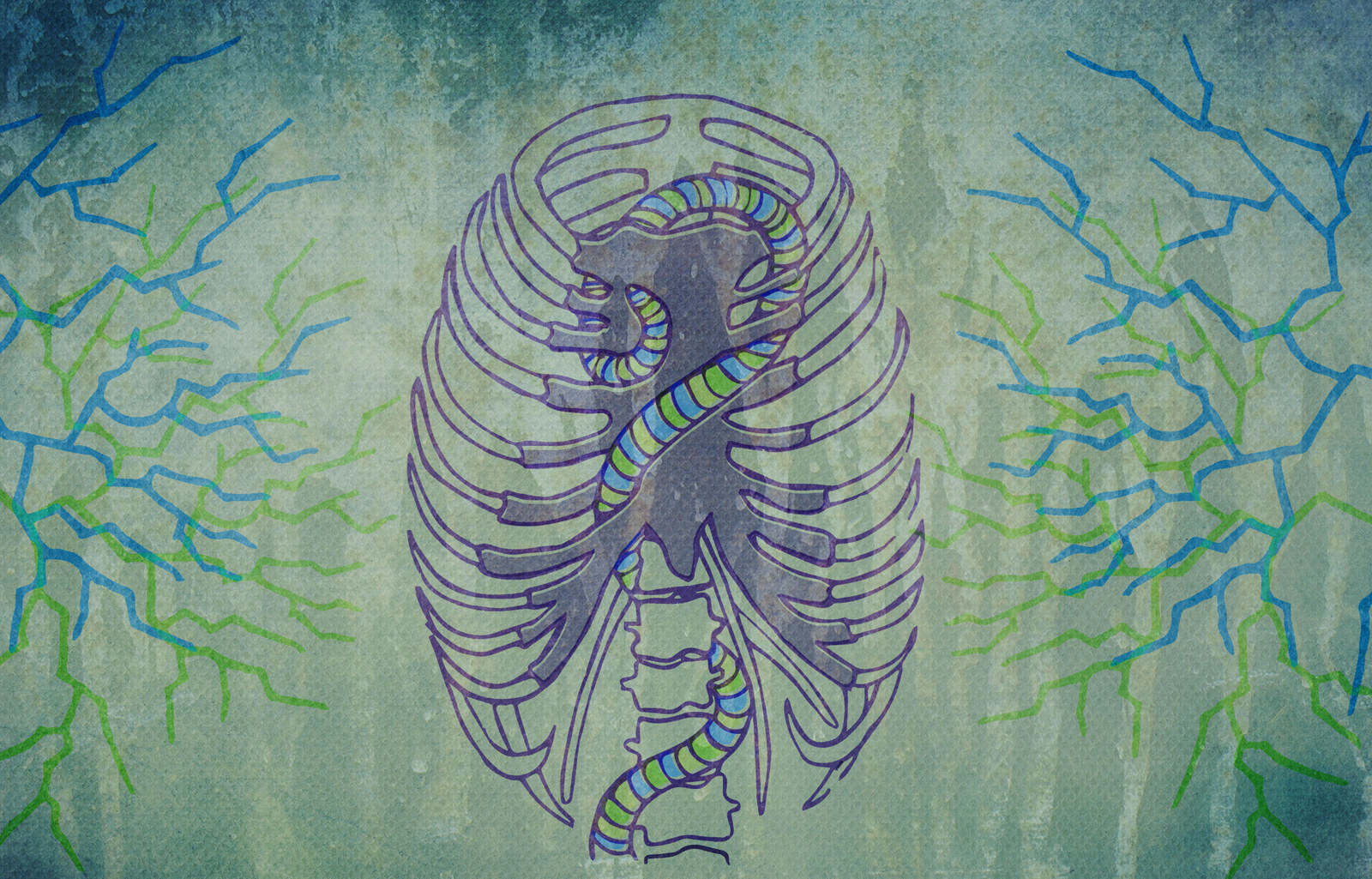
"I still tell my friends I am in recovery so they will hold me accountable."
10. What Comedy Taught Me About My Mental Illness — Kate Lindstedt

"I didn’t expect it, but stand-up comedy has given me the freedom to talk about depression and anxiety on my own terms."
11. The Night I Spoke Up About My #BlackSuicide — Terrell J. Starr
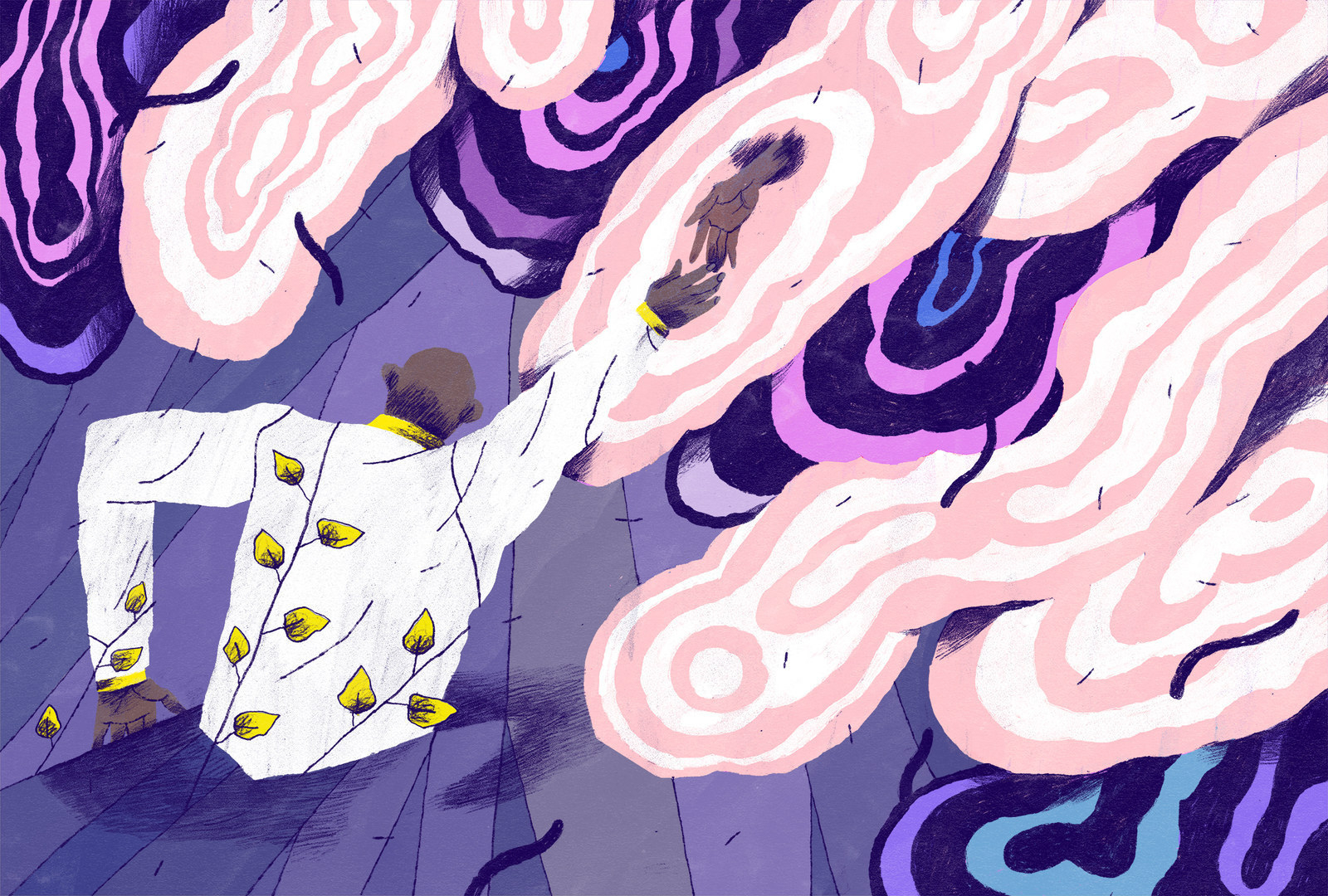
"My entire life was shaped by violence, so I wanted to end it violently. But I didn’t — thanks to overcoming the stigma surrounding African-Americans and depression, and to building a community on Twitter."
12. Knitting Myself Back Together — Alanna Okun

"The best way I’ve found to fight my anxiety is with a pair of knitting needles."
13. I Started Therapy So I Could Take Better Care Of Myself — Matt Ortile
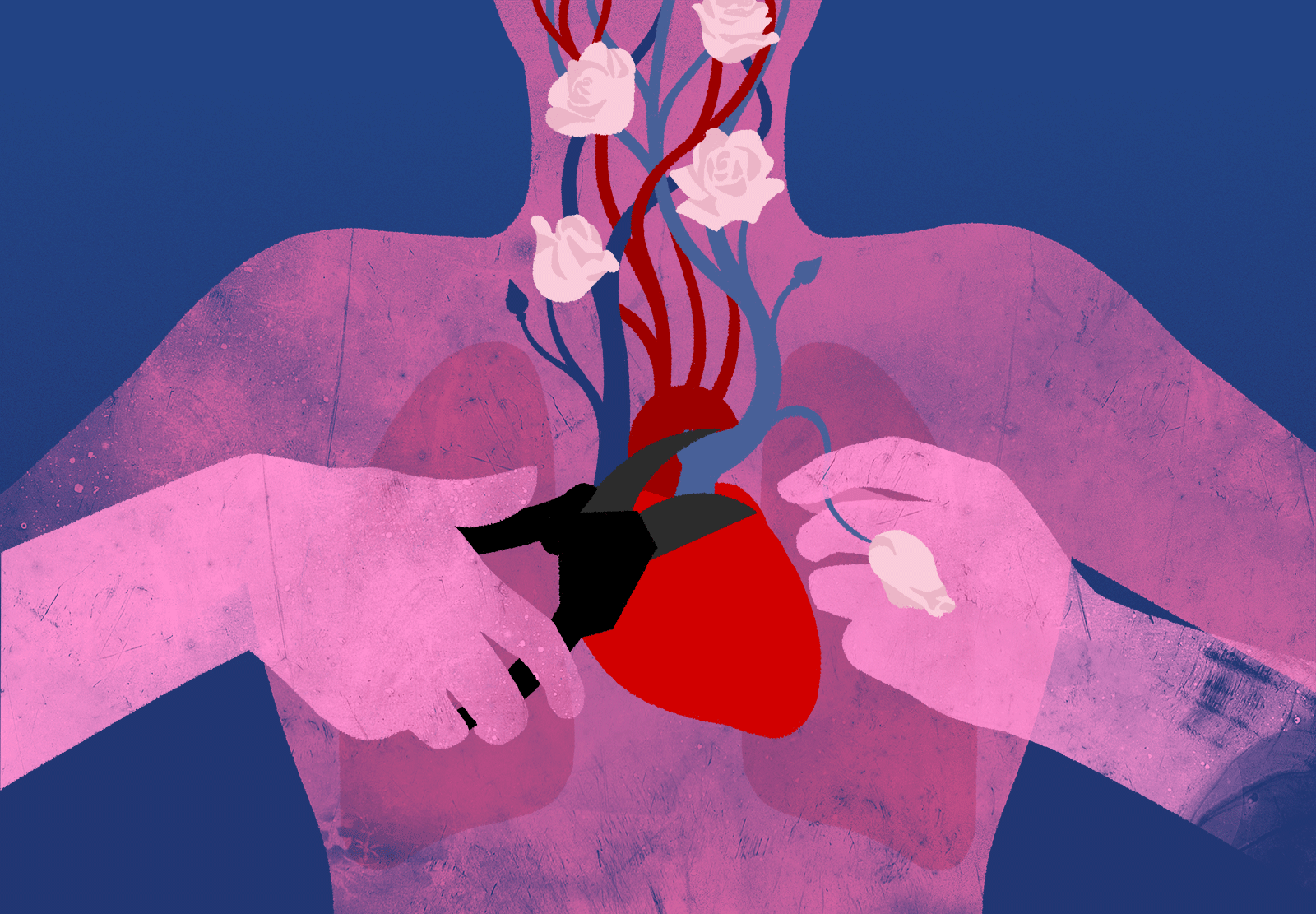
"I’d known for a while that I needed to see a therapist. It wasn’t until I felt like I could do without help that I finally sought it."
14. I’m Mending My Broken Relationship With Food — Anita Badejo

"After a lifetime struggling with disordered eating, I’m still figuring out how to have a healthy relationship with my body and what I feed it."
15. I Found Love In A Hopeless Mess — Kate Conger
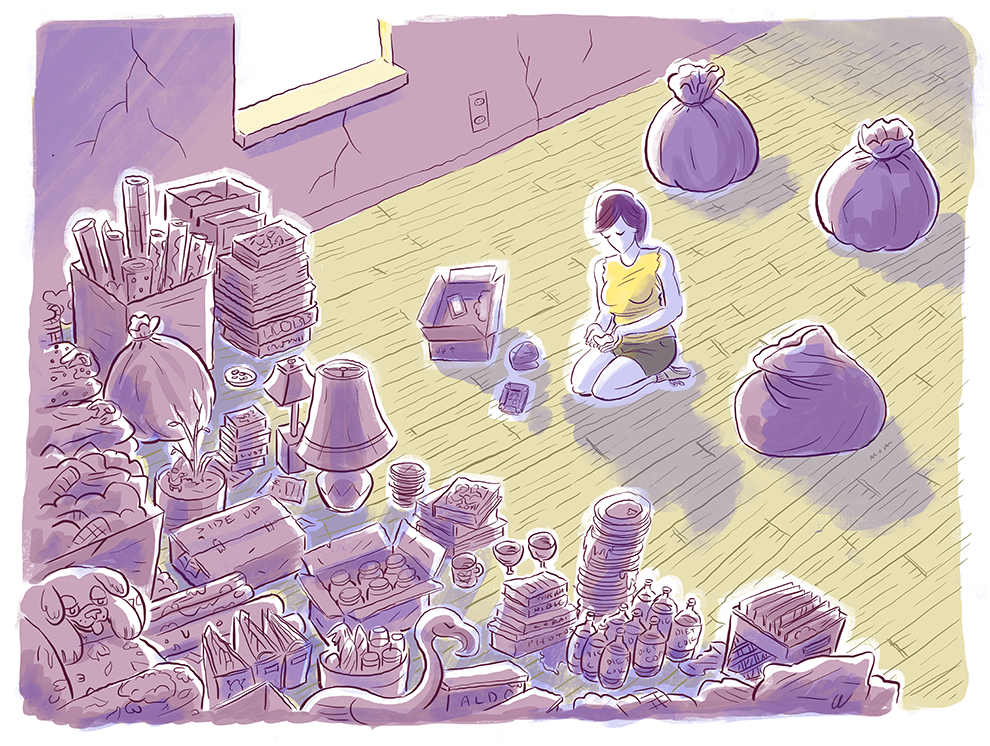
"Dehoarding my partner’s childhood home gave me a way to understand his mother, but I’m still not sure how to live with the habit he’s inherited."
16. When Taking Anxiety Medication Is A Revolutionary Act — Tracy Clayton
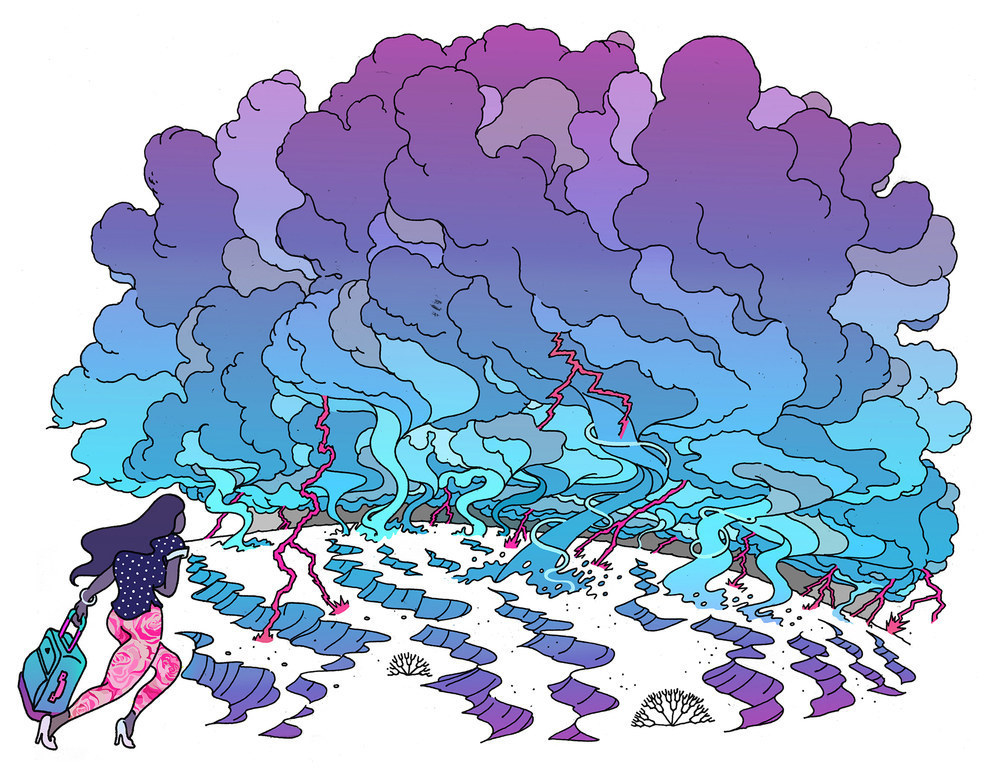
"I had to learn how to love myself enough to take care of myself. It wasn’t easy."
Topics in this article
- Mental Health
About Mental Health
- Mental Health Basics
- Types of Mental Illness
What is mental health?
Mental health includes our emotional, psychological, and social well-being. It affects how we think, feel, and act. It also helps determine how we handle stress, relate to others, and make healthy choices. 1 Mental health is important at every stage of life, from childhood and adolescence through adulthood.
Why is mental health important for overall health?
Mental and physical health are equally important components of overall health. For example, depression increases the risk for many types of physical health problems, particularly long-lasting conditions like diabetes , heart disease , and stroke. Similarly, the presence of chronic conditions can increase the risk for mental illness. 2
Can your mental health change over time?
Yes, it’s important to remember that a person’s mental health can change over time, depending on many factors. When the demands placed on a person exceed their resources and coping abilities, their mental health could be impacted. For example, if someone is working long hours, caring for a relative, or experiencing economic hardship, they may experience poor mental health.
How common are mental illnesses?
Mental illnesses are among the most common health conditions in the United States.
- More than 1 in 5 US adults live with a mental illness.
- Over 1 in 5 youth (ages 13-18) either currently or at some point during their life, have had a seriously debilitating mental illness. 5
- About 1 in 25 U.S. adults lives with a serious mental illness, such as schizophrenia, bipolar disorder, or major depression. 6
What causes mental illness?
There is no single cause for mental illness. A number of factors can contribute to risk for mental illness, such as
- Adverse Childhood Experiences , such as trauma or a history of abuse (for example, child abuse, sexual assault, witnessing violence, etc.)
- Experiences related to other ongoing (chronic) medical conditions, such as cancer or diabetes
- Biological factors or chemical imbalances in the brain
- Use of alcohol or drugs
- Having feelings of loneliness or isolation
People can experience different types of mental illnesses or disorders, and they can often occur at the same time. Mental illnesses can occur over a short period of time or be episodic. This means that the mental illness comes and goes with discrete beginnings and ends. Mental illness can also be ongoing or long-lasting.
There are more than 200 types of mental illness. Some of the main types of mental illness and disorders are listed here .
- Strengthening Mental Health Promotion . Fact sheet no. 220. Geneva, Switzerland: World Health Organization.
- Chronic Illness & Mental Health . Bethesda, MD: National Institutes of Health, National Institute of Mental Health. 2015.
- Kessler RC, Angermeyer M, Anthony JC, et al. Lifetime prevalence and age-of-onset distributions of mental disorders in the World Health Organization’s World Mental Health Survey Initiative. World Psychiatry. 2007;6(3):168-176.
- Key substance use and mental health indicators in the United States: Results from the 2015 National Survey on Drug Use and Health. Rockville, MD: Center for Behavioral Health Statistics and Quality. Substance Abuse and Mental Health Services Administration. 2016.
- Merikangas KR, He J, Burstein M, et al. Lifetime Prevalence of Mental Disorders in US Adolescents: Results from the National Comorbidity Study-Adolescent Supplement (NCS-A). Journal of the American Academy of Child and Adolescent Psychiatry. 2010;49(10):980-989. doi:10.1016/j.jaac.2010.05.017.
- Health & Education Statistics . Bethesda, MD: National Institute of Mental Health. National Institutes of Health. 2016.
- Kessler RC, Chiu WT, Demler O, Walters EE. Prevalence, Severity, and Comorbidity of Twelve-month DSM-IV Disorders in the National Comorbidity Survey Replication (NCS-R). Archives of general psychiatry. 2005;62(6):617-627. doi:10.1001/archpsyc.62.6.617.Substance Abuse and Mental Health Services Administration, Center for Behavioral Health Statistics and Quality. (2016). Key substance use and mental health indicators in the United States: Results from the 2015 National Survey on Drug Use and Health. Rockville, MD.
- Rui P, Hing E, Okeyode T. National Ambulatory Medical Care Survey: 2014 State and National Summary Tables. Atlanta, GA: National Center for Health Statistics. Centers for Disease Control and Prevention. 2014.
- Web-based Injury Statistics Query and Reporting System (WISQARS) . Atlanta, GA: National Center for Injury Prevention and Control. Centers for Disease Control and Prevention. 2015.
- Insel, T.R. Assessing the Economic Costs of Serious Mental Illness. Am J Psychiatry. 2008 Jun;165(6):663-5. doi: 10.1176/appi.ajp.2008.08030366.
- HCUP Facts and Figures: Statistics on Hospital-based Care in the United States, 2009. Rockville, MD: Agency for Healthcare Research and Quality. 2009.
- Reeves, WC et al. CDC Report: Mental Illness Surveillance Among Adults in the United States. MMWR Morb Mortal Wkly Rep 2011;60(03);1-32.
- Parks, J., et al. Morbidity and Mortality in People with Serious Mental Illness. Alexandria, VA: National Association of State Mental Health Program Directors Council. 2006.

Exit Notification / Disclaimer Policy
- The Centers for Disease Control and Prevention (CDC) cannot attest to the accuracy of a non-federal website.
- Linking to a non-federal website does not constitute an endorsement by CDC or any of its employees of the sponsors or the information and products presented on the website.
- You will be subject to the destination website's privacy policy when you follow the link.
- CDC is not responsible for Section 508 compliance (accessibility) on other federal or private website.
Most Teens Think AI Won’t Hurt Their Mental Health. Teachers Disagree

- Share article
High school theater teacher Lisa Dyer has noticed in recent years that her students are more reluctant to take risks or make what she calls “big choices” on stage.
As artificial intelligence expands over the next decade—going beyond algorithms suggesting everything from what TV show to watch to what word to type next in a text—she fears her students will be even more hesitant to follow their own instincts.
“The idea of perfection is very pervasive,” Dyer, who teaches at J.R. Tucker High School near Richmond, Va., said of how her students often think in an age increasingly dominated by AI. To her students, the essays spit out in seconds by generative AI tools like ChatGPT “seem like perfection. If the computer makes it up, that must be the right answer.”
She worries that her students’ creativity and self-confidence could be stifled, ultimately hindering their mental well-being.
On the other hand, Nicolas Gertler, 19, the AI and education adviser at Encode Justice , a nonprofit organization that works to promote a values-centered approach to AI, sees the potential for AI to do everything from make school more accessible to students with special learning needs to helping diagnose and treat diseases—which could be beneficial to everyone’s mental health.
And the college freshman wouldn’t mind if robots spared him from his least favorite tasks—especially doing laundry—leaving time for more fulfilling and creative pursuits, or just relaxation.
Teens have a sunnier view of AI than educators
Which vision is closer to what will actually happen? Not even top engineers can say for certain what AI will be capable of in 10 years—much less how it will impact teenagers’ mental health and well-being.
But one thing is clear: High school students and educators have very different perspectives on what AI will mean for young people’s mental health over the next decade, according to a pair of recent EdWeek Research Center surveys.
Educators generally have a dark view. More than two-thirds of teachers and school and district leaders—69 percent—expect that AI will have a negative impact on teens’ mental health over the next decade. Nearly a quarter—24 percent—believe it will be “very negative.” Just 14 percent anticipate a positive impact, including only 1 percent who think it will be “very positive,” according to the survey of 595 educators conducted from Dec. 21, 2023 to Jan. 2, 2024.
Explore the Survey Results
Teens themselves are much more optimistic. Just a quarter who participated in a recent EdWeek Research Center survey expect AI will have a negative impact on their mental health over the next 10 years. A slightly higher percentage—30 percent—expect it will actually have a positive effect, including 10 percent who imagine it will be “very positive.” The survey of 1,056 teenagers was conducted Feb. 9 through March 4.
Those findings are in keeping with how different generations have reacted to the introduction of new technologies—from television to the internet to smartphones, said Lee Rainie, a scholar-in-residence and director of the Imagining the Digital Future Center at Elon University, who has spent decades studying the impact of technology on society.
“Young people throughout history are more interested in new technologies than older folks are,” he said. “Younger folks are just sort of more inclined to be early adopters, they’re more inclined to be enthusiastic, they’re more inclined to think that older ways of doing things have been upgraded by new technologies.”
‘For them, this is just the natural progression’
Today’s teens, in particular, likely have a bright perspective on AI’s impact on mental health given that “young people have never lived a life that didn’t involve some form of AI,” said Carly Ghantous, a humanities instructor at Davidson Academy Online, a private virtual school. “They’ve always had Siri and Alexa in their houses. They’ve always had turn-by-turn navigation [GPS] on their phones—that early AI that we don’t even think of as AI anymore. I’m sure, for them, this is just the natural progression.”
Ava Havidic, a senior at Millennium 6-12 Collegiate Academy in Tamarac, Fla., had a similar take.
“I think Generation Z and just youth in general, we are so used to just hearing about the next big like technological advancement,” said Havidic, who is a student facilitator for the National Association of Secondary School Principals’ Student Leadership Network on Mental Health. “It just becomes our day-to-day life.”
And while adults try to crack down on cheating with AI , some teenagers see outsourcing their schoolwork to AI as a way to relieve anxiety, said Makena, a high school student in Kansas who preferred to go by her first name so that she could speak candidly about the issue.
“Students at my school are completing assignments through AI. I think, honestly, it helps their mental health because they’re not as stressed,” said Makena, who added that she has never tried to pass off the work of generative AI as her own.
Enlisting armies of trolling bots
But educators who think AI will have a negative impact on teens’ mental health over the next decade point to deepfakes —AI-manipulated video, audio, or photos created using someone’s voice or likeness without their permission—as Exhibit A in their argument.
Already, students have gotten in trouble for making and sharing deepfake pornographic images of their classmates, including male students at a high school in New Jersey who manipulated images of female classmates last fall. And, more recently, four students were expelled from a Beverly Hills, Calif., middle school for creating and distributing deepfake photos of other students.
AI also has great potential to supercharge cyberbullying, said Jeremy Sell, a high school English teacher in California. “Cyberbullying, and all of the things that go with that, AI is going to make it worse and harder,” he said.
As generative AI develops over the next decade, creating those types of deepfakes is bound to get easier—making them even more ubiquitous, Sell added.
What’s more, AI could exacerbate “general troll behavior, mocking people, attacking them, just making their lives miserable,” Rainie said. “Not only will active human trolls go after people, but they’ll enlist their bot armies to the cause.” That could look like bots attacking a particular user every time they sign on to a social platform, for example.
Unable to ‘trust their own eyes’
The ability to use AI to fabricate information has implications beyond just cyberbullying, said Kaywin Cottle, who teaches an AI course at Burley Junior High in Burley, Idaho. Once her students realize how easily images can be manipulated, it’s harder for them to take anything they see on the internet at face value.
“They know they can build something fake that looks real. They’re not going to even be able to trust their own eyes, what they see, what they hear, or what they read,” which could be very unsettling, Cottle said.
AI’s further development may exacerbate another problem: Students’ inability to resist social media— or screens in general .
Some of Sell’s students seem to spend their lives glued to their devices because social media algorithms on sites like TikTok—which are powered by AI—are so effective, he said.
Over time, he expects those algorithms will only get smarter, more powerful—and all the more addictive, making the virtual world more tempting, and the non-virtual one harder to navigate.
Over the next decade, too, bots may become more humanlike, leading to a landscape like the one depicted in the 2013 movie “Her”, in which a lonely man falls in love with an AI-powered operating system.
Rainie predicts teens “might get sucked into a world where their relationships with their bots and the relationship with synthetic environments are going to be more enriching, more appealing, more immersive than the real-world relationships they have, which are messy and boring, and complicated.”
What the ‘modern moment is all about’
On the other hand, in anticipating AI will have a negative impact on teen mental health, educators may be projecting their own fears about its disruptive potential on their jobs , Ghantous suggested.
“Our education system was created to make factory workers,” Ghantous said. “And AI is like, ‘we don’t need factory workers anymore.’”
Teachers and their students may have to work through that kind of anxiety together—along with the rest of society, Rainie said.
“Now that we’ve got an upgrade in our intelligence and our smartness through this tool, how do we take advantage of that without becoming slaves to it, basically?” he said. “That’s what the modern moment is all about. It’s, how do we get the good and diminish the bad that might come out of this?”

Data analysis for this article was provided by the EdWeek Research Center. Learn more about the center’s work.
A version of this article appeared in the April 03, 2024 edition of Education Week as Most Teens Think AI Won’t Hurt Their Mental Health. Teachers Disagree

Sign Up for EdWeek Tech Leader
Edweek top school jobs.

Sign Up & Sign In

There’s a Reason They’re Called ‘Gut’ Feelings

I n the 1800s, a French Canadian named Alexis St. Martin was shot in the stomach while at a fur trading post, when someone’s musket accidentally fired at close range. He survived, but his injuries resulted in a hole in his stomach wall. This provided an early window—literally—into how our emotions and mental health affect the gut. Through careful experiments, the surgeon William Beaumont discovered that St. Martin’s mental state had direct physiological consequences on his stomach’s activity: when he felt irritable, for example, his digestion slowed. Somehow, his emotional states were manifest in the specific, local biology of his gut.
Most people have experienced the gut consequences of their emotional feelings. Nerves before an exam might lead you to feel nauseous or even vomit. Profound sadness might make you lose your appetite, or perhaps cause a hunger impossible to satiate. Gut symptoms are common in mental health conditions, from appetite changes in depression to debilitating “psychosomatic” stomach pains. Many of our feelings are gut feelings.
But the gut doesn’t just respond to emotional feelings: it influences them, too. Take disgust. Disgust is visceral. Our stomach, like our heart, has a regular electrical rhythm; even just seeing something disgusting causes disruptions, called “dysrhythmias,” in this electrical signalling. Although disgust is crucial for survival—helping us avoid disease and stay alive—in many mental health conditions disgust becomes pathological. In obsessive compulsive disorder (OCD), for instance, dirt or germs can preoccupy someone’s thoughts, causing symptoms like compulsive hand-washing. Self-disgust is common in depression and eating disorders. And even post-traumatic disorder can be brought on by profoundly disgusting traumas.
Pathological disgust is particularly hard to treat : exposure therapy and other psychological approaches are much less effective than for fear-based mental health problems. A couple years ago, working as a neuroscientist at the University of Cambridge, I wondered if abnormal signals from the stomach could be causing disgust avoidance. I ran an experiment to test this hypothesis, and found that changing someone’s gut activity with a common anti-nausea drug reduced their disgust avoidance . This could represent a new way of treating pathological disgust in mental health disorders. For example, an anti-nausea drug could be administered just before exposure therapy, enabling patients to engage with therapy under a more optimal gut state.
Read More: How I Learned to Listen to What My Gut Was Telling Me
So gut feelings are not “all in your mind”—but they are not “all in your gut,” either. Sensations from the gut are transmitted to the brain via the vagus nerve, the primary channel of information sent from the body to the brain. A second route to target “gut feelings” is by electrically stimulating this nerve, which changes the electrical rhythm of the stomach . That said, the idea is not new: vagus nerve stimulation for patients with major depression dates back to 2000 .
A new theory published in November 2023 proposes that vagus nerve stimulation amplifies signals from the internal body to the brain, which helps us adapt our behaviour to its current challenges and needs. That could explain why the effects of vagus nerve stimulation are so wide-reaching, altering learning, memory, and motivation. That means amplifying signals from the gut using vagus nerve stimulation might improve mental health in some cases, but in others could be ineffective or even detrimental. Ultimately, we need to consider the state and needs of someone’s internal body before amplifying the body’s influence on the brain.
But the importance of the vagus nerve extends to even more established treatments: evidence from mice suggests that the most common type of antidepressant drugs (SSRIs, or selective serotonin reuptake inhibitors) require the vagus nerve to work. This, too, could begin to provide clues why antidepressants do, or don’t, work for a given person, and even help us understand why they might cause side effects in some people.
If the vagus nerve’s role helps us adapt to our bodily needs, perhaps the most important internal need of all is energy. One function of the gut—together with other organs—is metabolism, converting food to energy the body can use. There are mysterious and wide-ranging connections between our metabolic system and mental health. For example, the prevalence of depression in people with diabetes is two or three times higher than in the general population. It’s not clear why: diabetes could increase depression risk, or vice versa. My lab is currently testing a third possibility: that common metabolic factors might increase your risk of both depression and diabetes because of interactions between the body and the brain. If we’re right, this could open up avenues toward metabolic interventions that improve both physical and mental health.
Our brain and wider nervous system adapts to its circumstances, including the body’s internal, metabolic needs, as well as our experience of the environment around us. Because of this, your gut-brain connection is not static, but rather changes and adapts over time. A fascinating study in 2021 discovered that brain cells can re-activate gut inflammation that an animal has previously experienced. The mere “memory” of gut inflammation, stored in cells in the brain, induced the physical state in the body. So sometimes a “gut feeling” actually originates from the brain. This role of the brain in “gut feelings” means our brain has the capacity to produce dysfunctional gut symptoms via brain changes alone. This ability of the brain could have upsides as well, perhaps explaining why psychological therapy—which causes brain changes —can also treat some gut conditions .
Gut feelings originate from many sources: directly through the gut, through channels of communication between gut and brain, or even through the brain itself. In neuroscience, as we unravel the dynamic communications between gut and brain, we can begin to understand how these processes helped our ancestors survive—and how we could better harness them to improve emotional and mental wellbeing. A gut feeling might have many possible causes, but each of these represent a potential solution for mental health.
More Must-Reads From TIME
- Jane Fonda Champions Climate Action for Every Generation
- Biden’s Campaign Is In Trouble. Will the Turnaround Plan Work?
- Why We're Spending So Much Money Now
- The Financial Influencers Women Actually Want to Listen To
- Breaker Sunny Choi Is Heading to Paris
- Why TV Can’t Stop Making Silly Shows About Lady Journalists
- The Case for Wearing Shoes in the House
- Want Weekly Recs on What to Watch, Read, and More? Sign Up for Worth Your Time
Contact us at [email protected]
You May Also Like

Transforming the understanding and treatment of mental illnesses.
Información en español
Celebrating 75 Years! Learn More >>
- Science News
- Meetings and Events
- Social Media
- Press Resources
- Email Updates
- Innovation Speaker Series
Revolutionizing the Study of Mental Disorders
March 27, 2024 • Feature Story • 75th Anniversary
At a Glance:
- The Research Domain Criteria framework (RDoC) was created in 2010 by the National Institute of Mental Health.
- The framework encourages researchers to examine functional processes that are implemented by the brain on a continuum from normal to abnormal.
- This way of researching mental disorders can help overcome inherent limitations in using all-or-nothing diagnostic systems for research.
- Researchers worldwide have taken up the principles of RDoC.
- The framework continues to evolve and update as new information becomes available.
President George H. W. Bush proclaimed the 1990s “ The Decade of the Brain ,” urging the National Institutes of Health, the National Institute of Mental Health (NIMH), and others to raise awareness about the benefits of brain research.
“Over the years, our understanding of the brain—how it works, what goes wrong when it is injured or diseased—has increased dramatically. However, we still have much more to learn,” read the president’s proclamation. “The need for continued study of the brain is compelling: millions of Americans are affected each year by disorders of the brain…Today, these individuals and their families are justifiably hopeful, for a new era of discovery is dawning in brain research.”
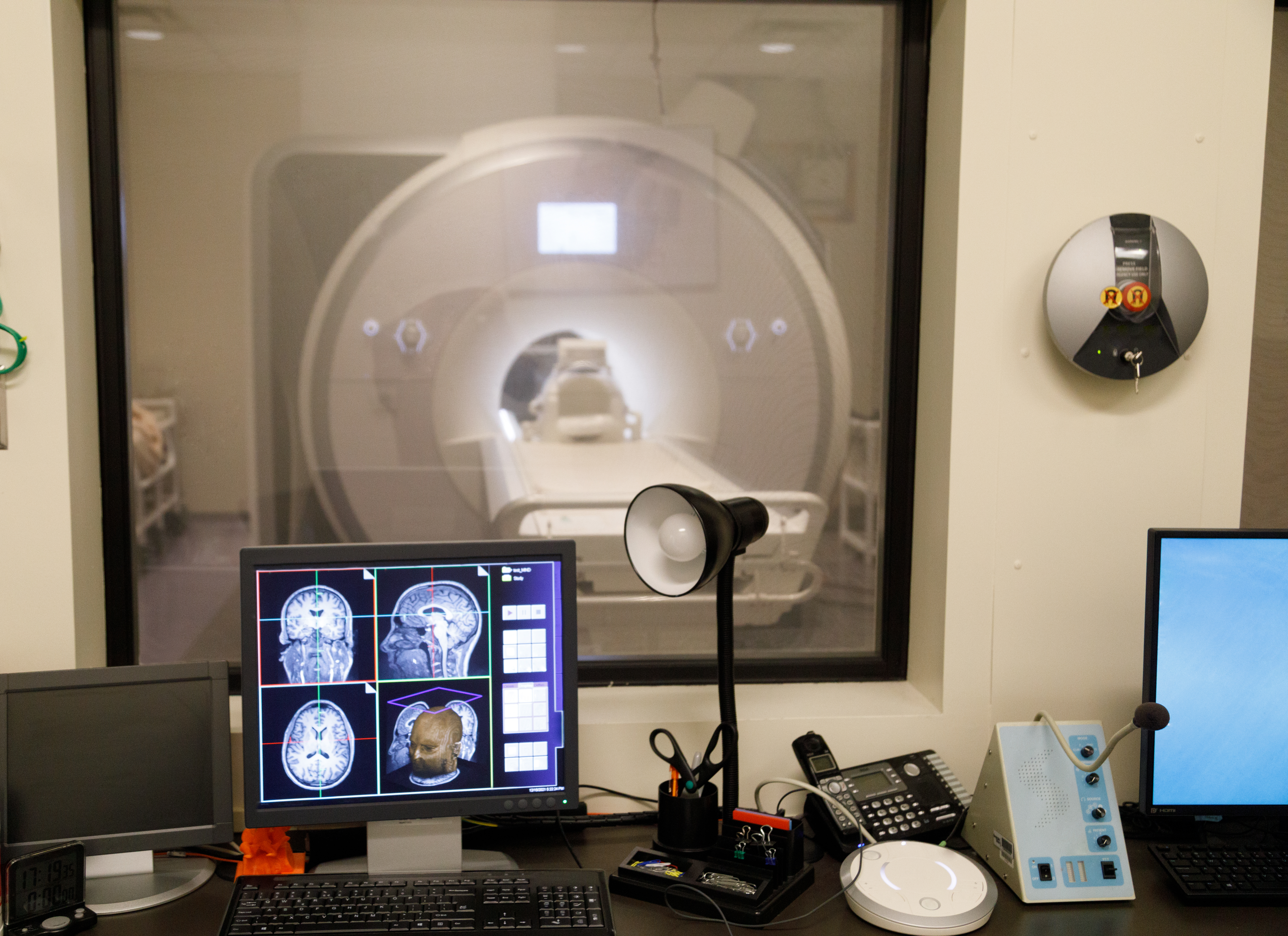
Still, despite the explosion of new techniques and tools for studying the brain, such as functional magnetic resonance imaging (fMRI), many mental health researchers were growing frustrated that their field was not progressing as quickly as they had hoped.
For decades, researchers have studied mental disorders using diagnoses based on the Diagnostic and Statistical Manual of Mental Disorders (DSM)—a handbook that lists the symptoms of mental disorders and the criteria for diagnosing a person with a disorder. But, among many researchers, suspicion was growing that the system used to diagnose mental disorders may not be the best way to study them.
“There are many benefits to using the DSM in medical settings—it provides reliability and ease of diagnosis. It also provides a clear-cut diagnosis for patients, which can be necessary to request insurance-based coverage of healthcare or job- or school-based accommodations,” said Bruce Cuthbert, Ph.D., who headed the workgroup that developed NIMH’s Research Domain Criteria Initiative. “However, when used in research, this approach is not always ideal.”
Researchers would often test people with a specific diagnosed DSM disorder against those with a different disorder or with no disorder and see how the groups differed. However, different mental disorders can have similar symptoms, and people can be diagnosed with several different disorders simultaneously. In addition, a diagnosis using the DSM is all or none—patients either qualify for the disorder based on their number of symptoms, or they don’t. This black-and-white approach means there may be people who experience symptoms of a mental disorder but just miss the cutoff for diagnosis.
Dr. Cuthbert, who is now the senior member of the RDoC Unit which orchestrates RDoC work, stated that “Diagnostic systems are based on clinical signs and symptoms, but signs and symptoms can’t really tell us much about what is going on in the brain or the underlying causes of a disorder. With modern neuroscience, we were seeing that information on genetic, pathophysiological, and psychological causes of mental disorders did not line up well with the current diagnostic disorder categories, suggesting that there were central processes that relate to mental disorders that were not being reflected in DMS-based research.”
Road to evolution
Concerned about the limits of using the DSM for research, Dr. Cuthbert, a professor of clinical psychology at the University of Minnesota at the time, approached Dr. Thomas Insel (then NIMH director) during a conference in the autumn of 2008. Dr. Cuthbert recalled saying, “I think it’s really important that we start looking at dimensions of functions related to mental disorders such as fear, working memory, and reward systems because we know that these dimensions cut across various disorders. I think NIMH really needs to think about mental disorders in this new way.”
Dr. Cuthbert didn’t know it then, but he was suggesting something similar to ideas that NIMH was considering. Just months earlier, Dr. Insel had spearheaded the inclusion of a goal in NIMH’s 2008 Strategic Plan for Research to “develop, for research purposes, new ways of classifying mental disorders based on dimensions of observable behavior and neurobiological measures.”
Unaware of the new strategic goal, Dr. Cuthbert was surprised when Dr. Insel's senior advisor, Marlene Guzman, called a few weeks later to ask if he’d be interested in taking a sabbatical to help lead this new effort. Dr. Cuthbert soon transitioned into a full-time NIMH employee, joining the Institute at an exciting time to lead the development of what became known as the Research Domain Criteria (RDoC) Framework. The effort began in 2009 with the creation of an internal working group of interdisciplinary NIMH staff who identified core functional areas that could be used as examples of what research using this new conceptual framework looked like.
The workgroup members conceived a bold change in how investigators studied mental disorders.
“We wanted researchers to transition from looking at mental disorders as all or none diagnoses based on groups of symptoms. Instead, we wanted to encourage researchers to understand how basic core functions of the brain—like fear processing and reward processing—work at a biological and behavioral level and how these core functions contribute to mental disorders,” said Dr. Cuthbert.
This approach would incorporate biological and behavioral measures of mental disorders and examine processes that cut across and apply to all mental disorders. From Dr. Cuthbert’s standpoint, this could help remedy some of the frustrations mental health researchers were experiencing.
Around the same time the workgroup was sharing its plans and organizing the first steps, Sarah Morris, Ph.D., was a researcher focusing on schizophrenia at the University of Maryland School of Medicine in Baltimore. When she first read these papers, she wondered what this new approach would mean for her research, her grants, and her lab.
She also remembered feeling that this new approach reflected what she was seeing in her data.
“When I grouped my participants by those with and without schizophrenia, there was a lot of overlap, and there was a lot of variability across the board, and so it felt like RDoC provided the pathway forward to dissect that and sort it out,” said Dr. Morris.
Later that year, Dr. Morris joined NIMH and the RDoC workgroup, saying, “I was bumping up against a wall every day in my own work and in the data in front of me. And the idea that someone would give the field permission to try something new—that was super exciting.”
The five original RDoC domains of functioning were introduced to the broader scientific community in a series of articles published in 2010 .
To establish the new framework, the RDoC workgroup (including Drs. Cuthbert and Morris) began a series of workshops in 2011 to collect feedback from experts in various areas from the larger scientific community. Five workshops were held over the next two years, each with a different broad domain of functioning based upon prior basic behavioral neuroscience. The five domains were called:
- Negative valence (which included processes related to things like fear, threat, and loss)
- Positive valence (which included processes related to working for rewards and appreciating rewards)
- Cognitive processes
- Social processes
- Arousal and regulation processes (including arousal systems for the body and sleep).
At each workshop, experts defined several specific functions, termed constructs, that fell within the domain of interest. For instance, constructs in the cognitive processes domain included attention, memory, cognitive control, and others.
The result of these feedback sessions was a framework that described mental disorders as the interaction between different functional processes—processes that could occur on a continuum from normal to abnormal. Researchers could measure these functional processes in a variety of complementary ways—for example, by looking at genes associated with these processes, the brain circuits that implement these processes, tests or observations of behaviors that represent these functional processes, and what patients report about their concerns. Also included in the framework was an understanding that functional processes associated with mental disorders are impacted and altered by the environment and a person’s developmental stage.
Preserving momentum
Over time, the Framework continued evolving and adapting to the changing science. In 2018, a sixth functional area called sensorimotor processes was added to the Framework, and in 2019, a workshop was held to better incorporate developmental and environmental processes into the framework.;
Since its creation, the use of RDoC principles in mental health research has spread across the U.S. and the rest of the world. For example, the Psychiatric Ratings using Intermediate Stratified Markers project (PRISM) , which receives funding from the European Union’s Innovative Medicines Initiative, is seeking to link biological markers of social withdrawal with clinical diagnoses using RDoC-style principles. Similarly, the Roadmap for Mental Health Research in Europe (ROAMER) project by the European Commission sought to integrate mental health research across Europe using principles similar to those in the RDoC Framework.;
Dr. Morris, who has acceded to the Head of the RDoC Unit, commented: “The fact that investigators and science funders outside the United States are also pursuing similar approaches gives me confidence that we’ve been on the right pathway. I just think that this has got to be how nature works and that we are in better alignment with the basic fundamental processes that are of interest to understanding mental disorders.”
The RDoC framework will continue to adapt and change with emerging science to remain relevant as a resource for researchers now and in the future. For instance, NIMH continues to work toward the development and optimization of tools to assess RDoC constructs and supports data-driven efforts to measure function within and across domains.
“For the millions of people impacted by mental disorders, research means hope. The RDoC framework helps us study mental disorders in a different way and has already driven considerable change in the field over the past decade,” said Joshua A. Gordon, M.D., Ph.D., director of NIMH. “We hope this and other innovative approaches will continue to accelerate research progress, paving the way for prevention, recovery, and cure.”
Publications
Cuthbert, B. N., & Insel, T. R. (2013). Toward the future of psychiatric diagnosis: The seven pillars of RDoC. BMC Medicine , 11 , 126. https://doi.org/10.1186/1741-7015-11-126
Cuthbert B. N. (2014). Translating intermediate phenotypes to psychopathology: The NIMH Research Domain Criteria. Psychophysiology , 51 (12), 1205–1206. https://doi.org/10.1111/psyp.12342
Cuthbert, B., & Insel, T. (2010). The data of diagnosis: New approaches to psychiatric classification. Psychiatry , 73 (4), 311–314. https://doi.org/10.1521/psyc.2010.73.4.311
Cuthbert, B. N., & Kozak, M. J. (2013). Constructing constructs for psychopathology: The NIMH research domain criteria. Journal of Abnormal Psychology , 122 (3), 928–937. https://doi.org/10.1037/a0034028
Garvey, M. A., & Cuthbert, B. N. (2017). Developing a motor systems domain for the NIMH RDoC program. Schizophrenia Bulletin , 43 (5), 935–936. https://doi.org/10.1093/schbul/sbx095
Insel, T. (2013). Transforming diagnosis . http://www.nimh.nih.gov/about/director/2013/transforming-diagnosis.shtml
Kozak, M. J., & Cuthbert, B. N. (2016). The NIMH Research Domain Criteria initiative: Background, issues, and pragmatics. Psychophysiology , 53 (3), 286–297. https://doi.org/10.1111/psyp.12518
Morris, S. E., & Cuthbert, B. N. (2012). Research Domain Criteria: Cognitive systems, neural circuits, and dimensions of behavior. Dialogues in Clinical Neuroscience , 14 (1), 29–37. https://doi.org/10.31887/DCNS.2012.14.1/smorris
Sanislow, C. A., Pine, D. S., Quinn, K. J., Kozak, M. J., Garvey, M. A., Heinssen, R. K., Wang, P. S., & Cuthbert, B. N. (2010). Developing constructs for psychopathology research: Research domain criteria. Journal of Abnormal Psychology , 119 (4), 631–639. https://doi.org/10.1037/a0020909
- Presidential Proclamation 6158 (The Decade of the Brain)
- Research Domain Criteria Initiative website
- Psychiatric Ratings using Intermediate Stratified Markers (PRISM)
- Roadmap for Mental Health Research in Europe (ROAMER)

IMAGES
VIDEO
COMMENTS
Mental health refers to a person's psychological, emotional, and social well-being; it influences what they feel and how they think, and behave. The state of cognitive and behavioural well-being is referred to as mental health. The term 'mental health' is also used to refer to the absence of mental disease. Mental health means keeping our minds ...
Answer: Common topics in a mental health essay might include the definition and importance of mental health, the connection between mental and physical well-being, various mental disorders and their symptoms, societal stigmas and misconceptions, the impact of modern life on mental health, and the significance of therapy and counseling.
Definition and Understanding of Mental Health. Mental health encompasses a person's emotional, psychological, and social well-being. It affects how individuals think, feel, and act, and helps determine how they handle stress, relate to others, and make choices. Good mental health is essential for functioning well in everyday life, maintaining ...
Mental health is a term used to describe emotional, psychological, and social well-being. The quality of a person's mental health is often measured by how adaptively they can cope with everyday stressors. Mental health allows people to use their abilities, be productive, make decisions, and play an active role in their communities.
Mental health is a state of mental well-being that enables people to cope with the stresses of life, realize their abilities, learn well and work well, and contribute to their community. It is an integral component of health and well-being that underpins our individual and collective abilities to make decisions, build relationships and shape ...
The Importance of Mental Health. Your mental health is an important part of your well-being. This aspect of your welfare determines how you're able to operate psychologically, emotionally, and socially among others. Considering how much of a role your mental health plays in each aspect of your life, it's important to guard and improve ...
The mental health essay is an insight into the importance of mental health in everyone's life. Mental Health. In the formidable years, this had no specific theme planned. The main aim was to promote and advocate the public on important issues. Also, in the first three years, one of the central activities done to help the day become special ...
Mental health is very important at every stage of our life, from childhood and adolescence through adulthood and even until we get old. Mental health is the state of an individual who is functioning at a satisfactory level of emotional and behavioral adjustment. It affects how we think, act and feel. Also, it helps to determine how we handle ...
This topic is nuanced and shouldn't be treated as a black-and-white issue. Write from an informed and compassionate point of view and offer your readers hope. Use this guide to write an essay on mental health in college students that astounds and delights your professor. Putting in the work will build research and communication skills you ...
Mental health struggles can create challenges you must overcome during your education and could be an opportunity for you to show how you've handled challenges and overcome obstacles. If you're considering writing your essay for college admission on this topic, consider talking to your school counselor or with an English teacher on how to frame the essay.
Phones and Teenagers' Mental Health Connection. This essay aims to discuss the connection between phones and teenagers' mental health and explain why the use of smartphones is merely a reflection of problems that children would face either way. Psychological Imbalance: Mental Health Issues.
Mental health is an essential aspect of overall well-being, yet it often faces stigma and neglect. Essays on mental health might cover topics such as mental illness, therapy, and the importance of mental health awareness. Our samples can assist you in creating essays that highlight the meaning of mental health in society.
Introduction. A major obstacle for integrating mental health initiatives into global health programmes and primary healthcare services is lack of consensus on a definition of mental health.1-3 There is little agreement on a general definition of 'mental health'4 and currently there is widespread use of the term 'mental health' as a euphemism for 'mental illness'.5 Mental health ...
Here are some of the most moving and illuminating essays published on BuzzFeed about mental illness, wellness, and the way our minds work. ... 16 Personal Essays About Mental Health Worth Reading. ... the "right" kind of diagnosis could mean the difference between a productive life and a life sentence." 5.
Mental health refers to our emotional and social well-being and impacts how we think, feel, and behave. It plays a role in connecting with others, making decisions, handling stress, and many other aspects of daily life. Everyone has mental health, and it deserves your attention just as much as your physical health does.
Mental health includes our emotional, psychological, and social well-being. It affects how we think, feel, and act. It also helps determine how we handle stress, relate to others, and make healthy choices. 1 Mental health is important at every stage of life, from childhood and adolescence through adulthood.
Mental Health Essay: Mental Health includes one's psychological, emotional and social well-being - one's mental health affects how they think, feel and act. It also helps in determining how one handles stress, makes choices and relates to others. Mental health can affect one's daily life activities, relationships and physical health. Mental health refers to the condition […]
A person's mental health offers them a sense of self-worth, power, and an awareness of how their bodies and minds work. Bhugra et al. (2013) suggests that feeling good about oneself and others, as ...
Eat healthy, regular meals and stay hydrated. A balanced diet and plenty of water can improve your energy and focus throughout the day. Pay attention to your intake of caffeine and alcohol and how they affect your mood and well-being—for some, decreasing caffeine and alcohol consumption can be helpful. Make sleep a priority.
Summary. Emotional health refers to how a person thinks and feels. The ability to acknowledge and cope with both positive and negative emotions is a sign of good emotional health. Emotional well ...
The history of mental health began with the term keeper and attendants of the insane whose role it was to control and maintain the order of the inmates within the institutions that had been built to house them, to then the term nurse slowly being introduced. Asylums were then slowly becoming phased out largely due to overcrowding, with some of ...
Argumentative Essay Topics on Mental Health. Mental health is an important and often overlooked topic. In this article, we'll explore some argumentative essay topics related to mental health. Debates about mental health. 1. The definition of mental health is contested and argued by professionals in the field. 2.
The Importance of Physical Health. Physical health refers to the well-being of the body and its ability to function optimally. It encompasses various factors, including nutrition, exercise, and regular medical check-ups. Advocates of the significance of physical health argue that a healthy body forms the foundation for a healthy mind.
But one thing is clear: High school students and educators have very different perspectives on what AI will mean for young people's mental health over the next decade, according to a pair of ...
There are mysterious and wide-ranging connections between our metabolic system and mental health. For example, the prevalence of depression in people with diabetes is two or three times higher ...
President George H. W. Bush proclaimed the 1990s "The Decade of the Brain ," urging the National Institutes of Health, the National Institute of Mental Health (NIMH), and others to raise awareness about the benefits of brain research. "Over the years, our understanding of the brain—how it works, what goes wrong when it is injured or diseased—has increased dramatically.
World Health Day 2024 is 'My health, my right'. This year's theme was chosen to champion the right of everyone, everywhere to have access to quality health services, education, and information, as well as safe drinking water, clean air, good nutrition, quality housing, decent working and environmental conditions, and freedom from discrimination.